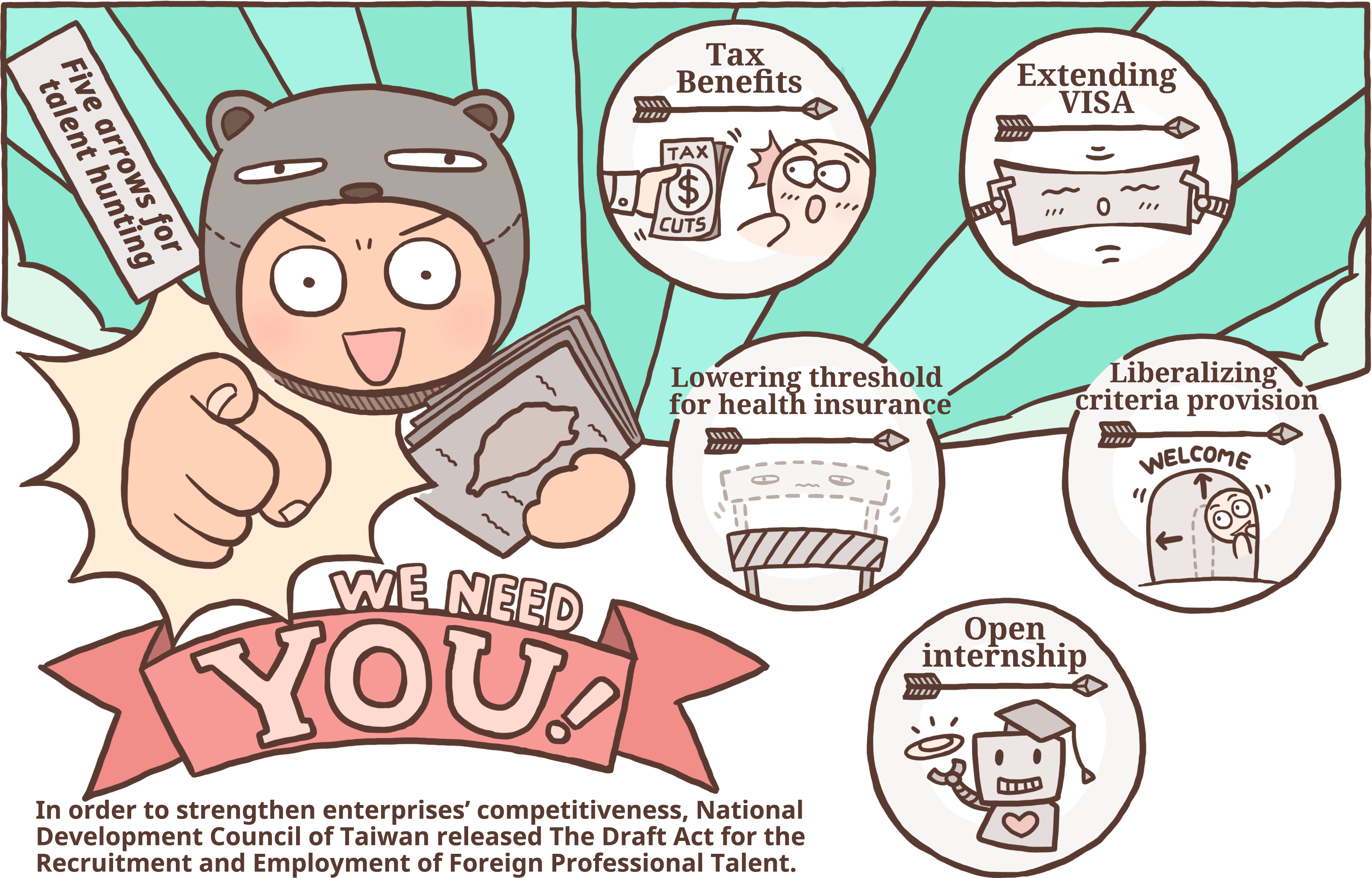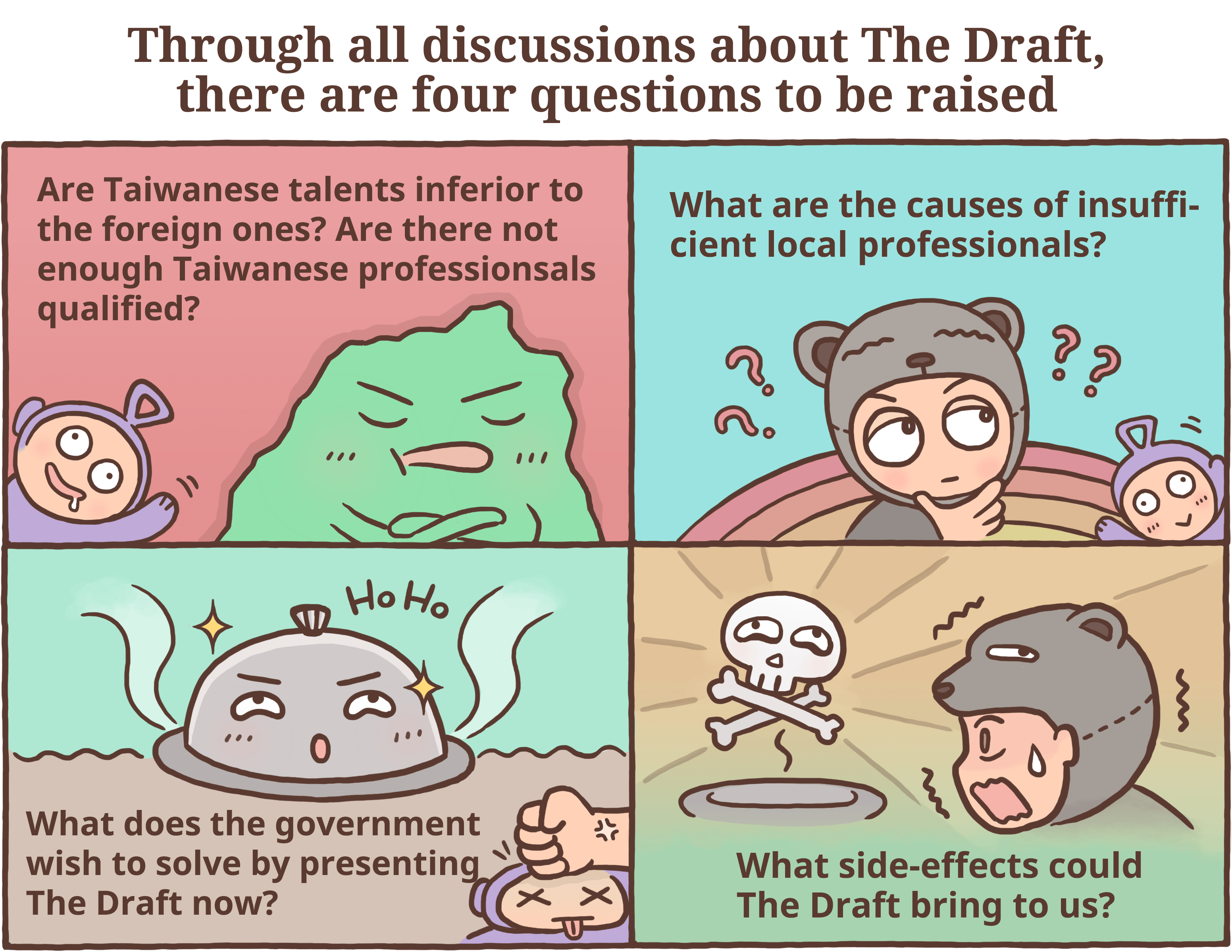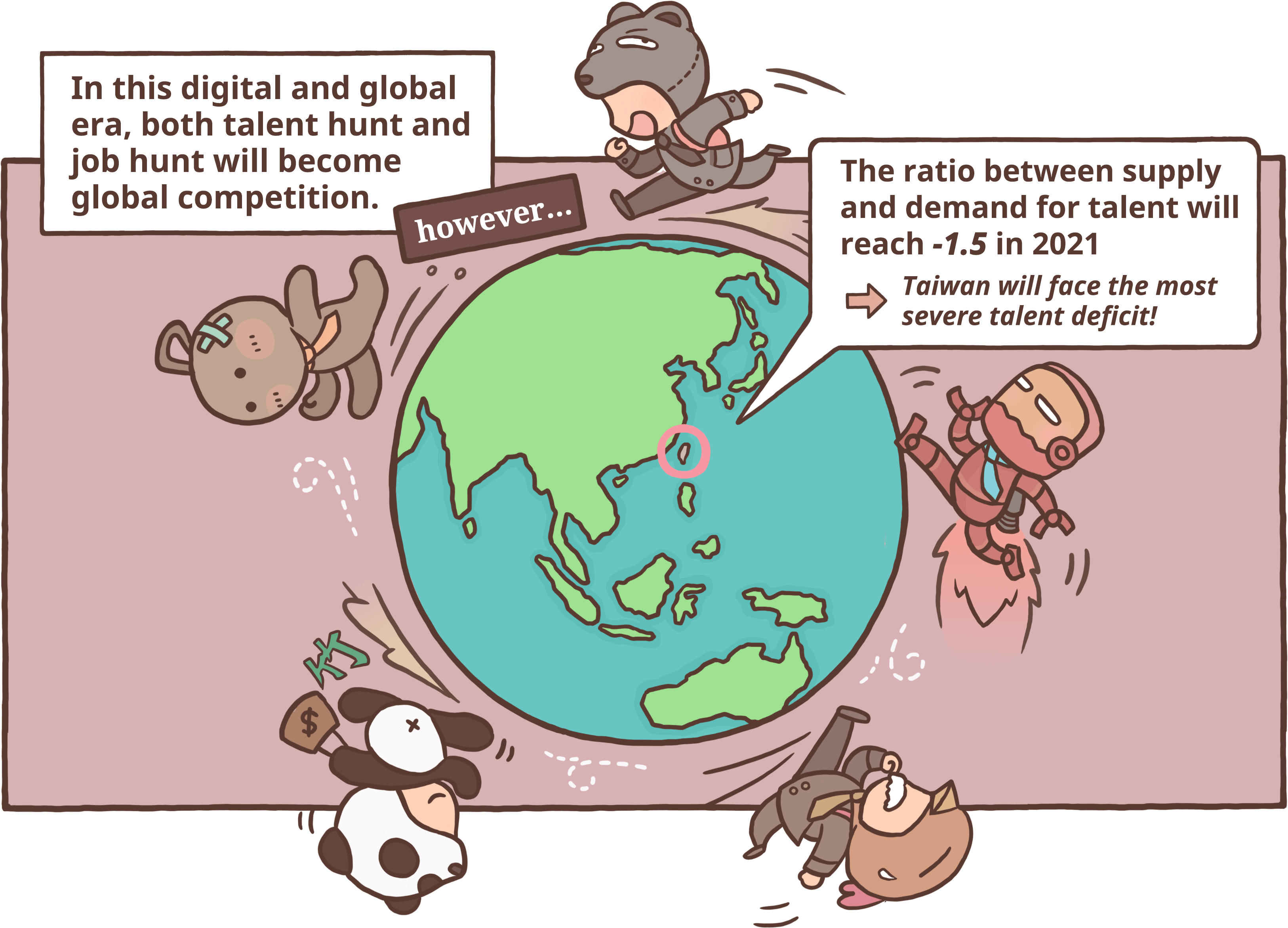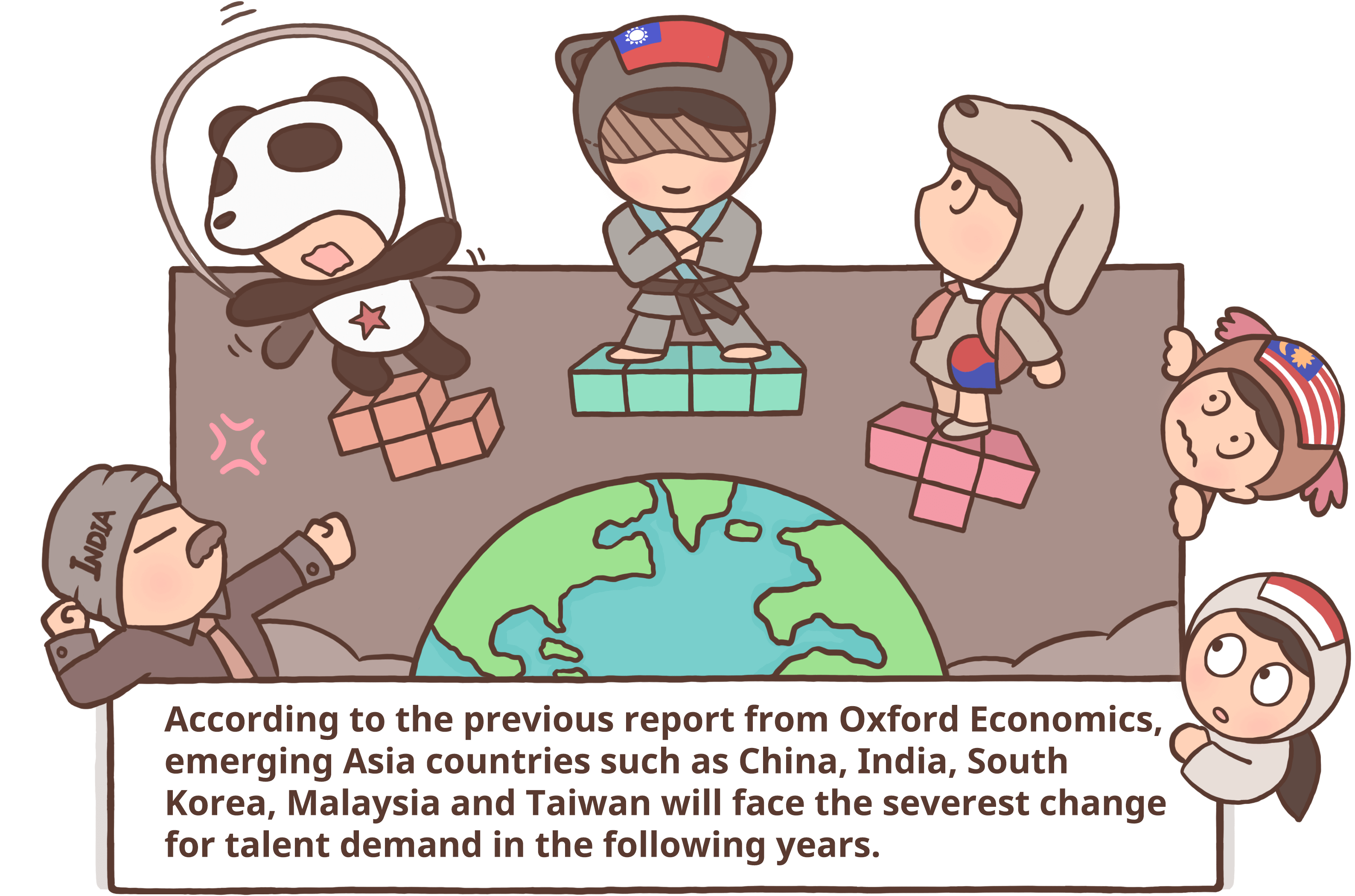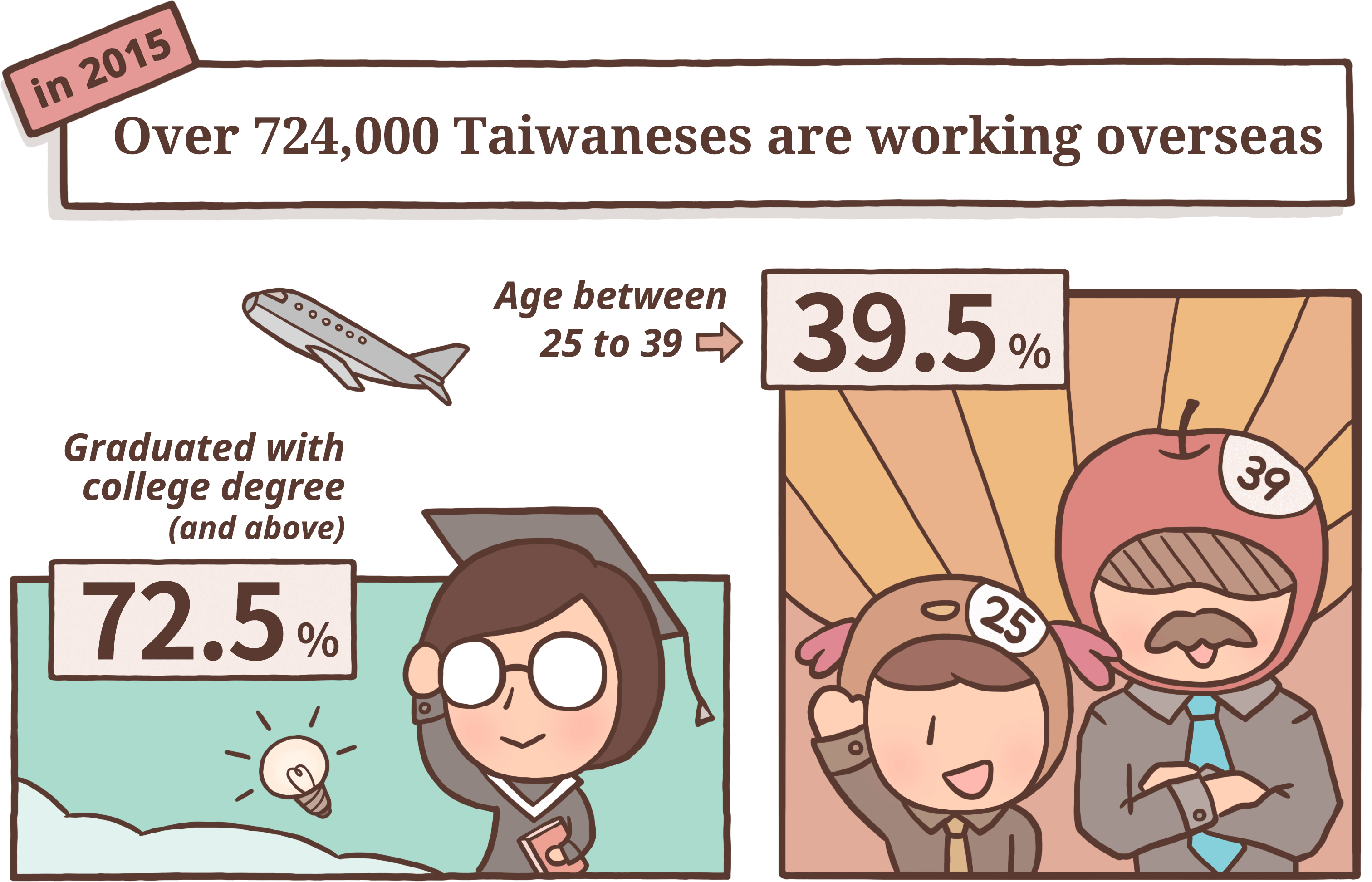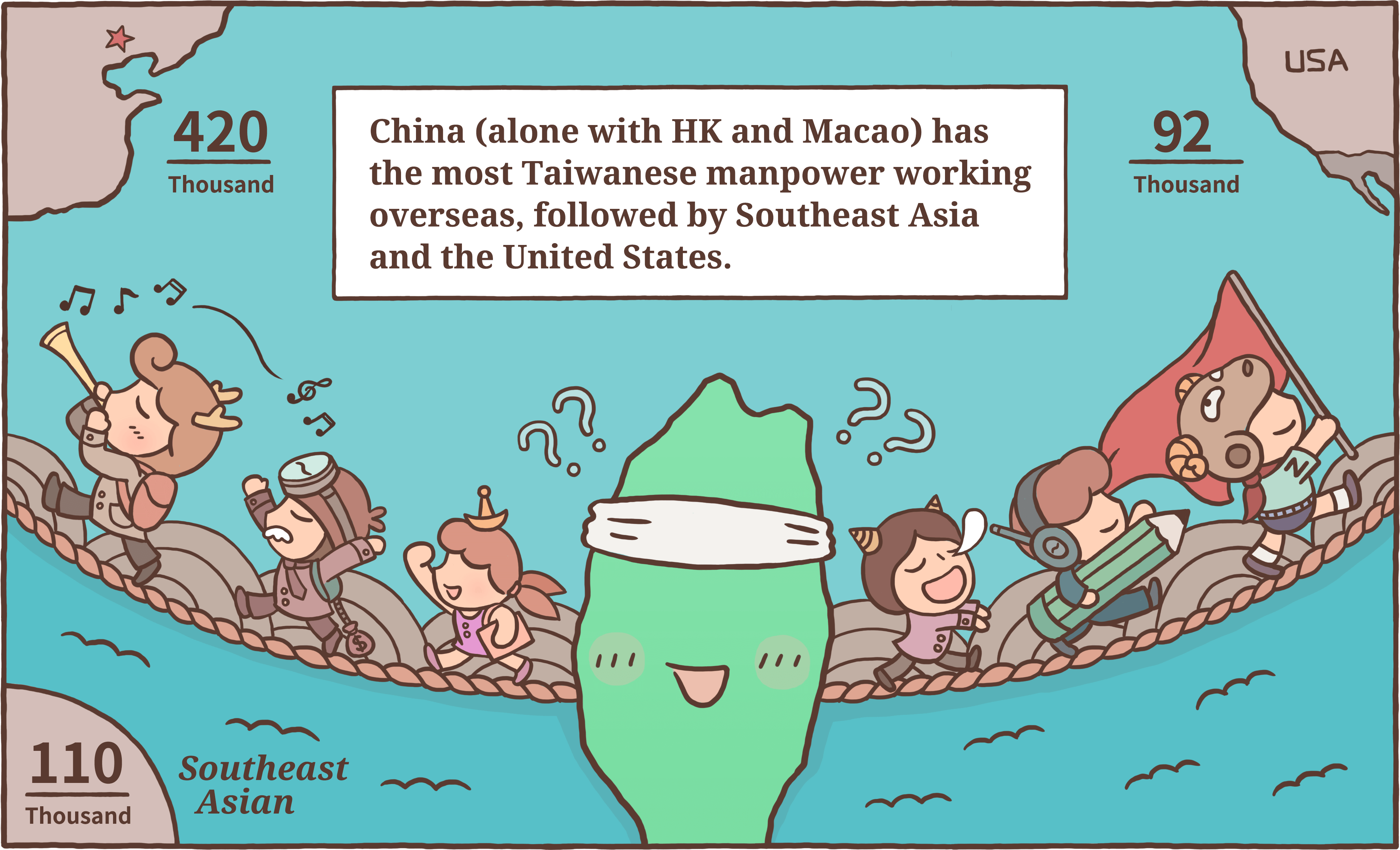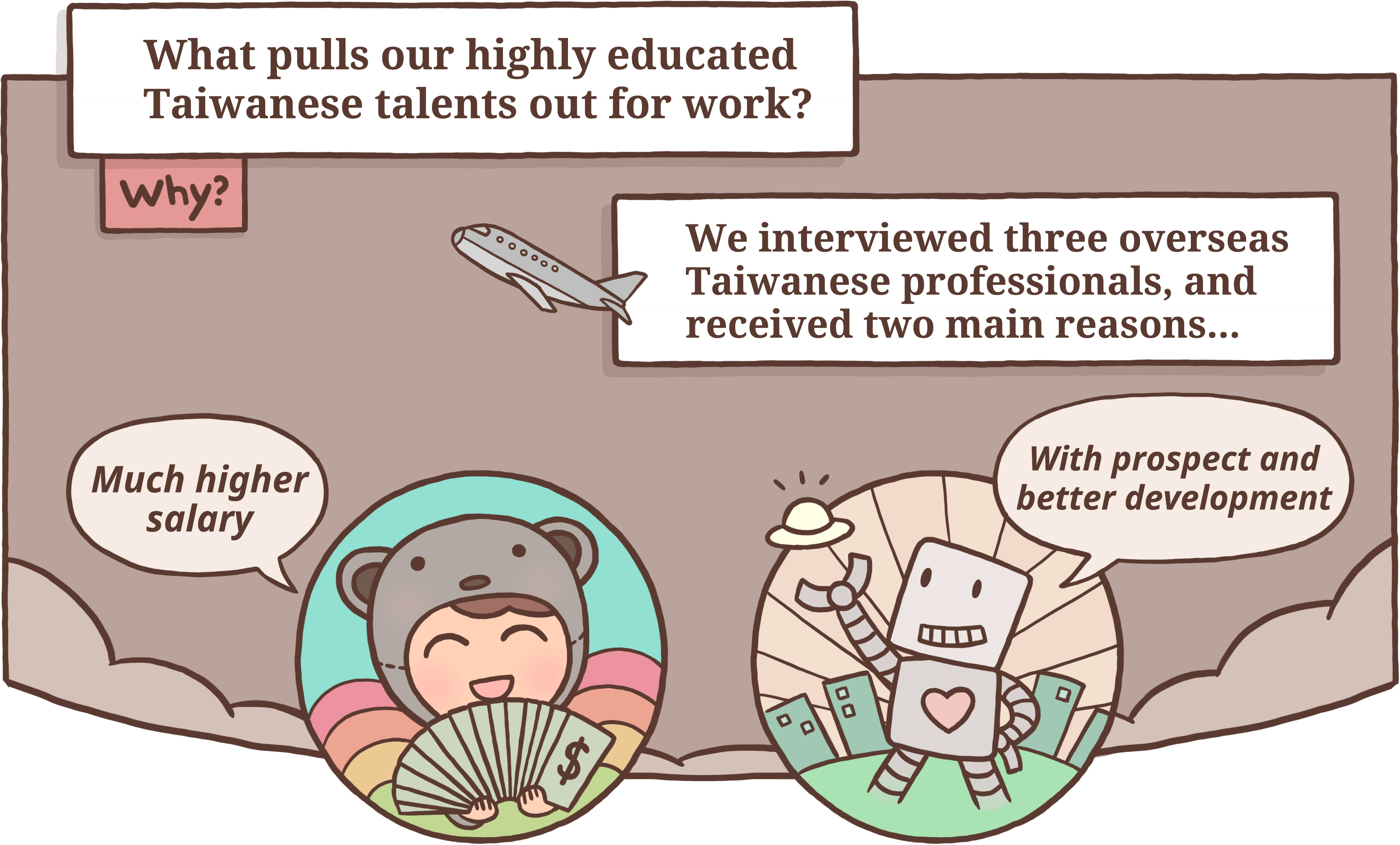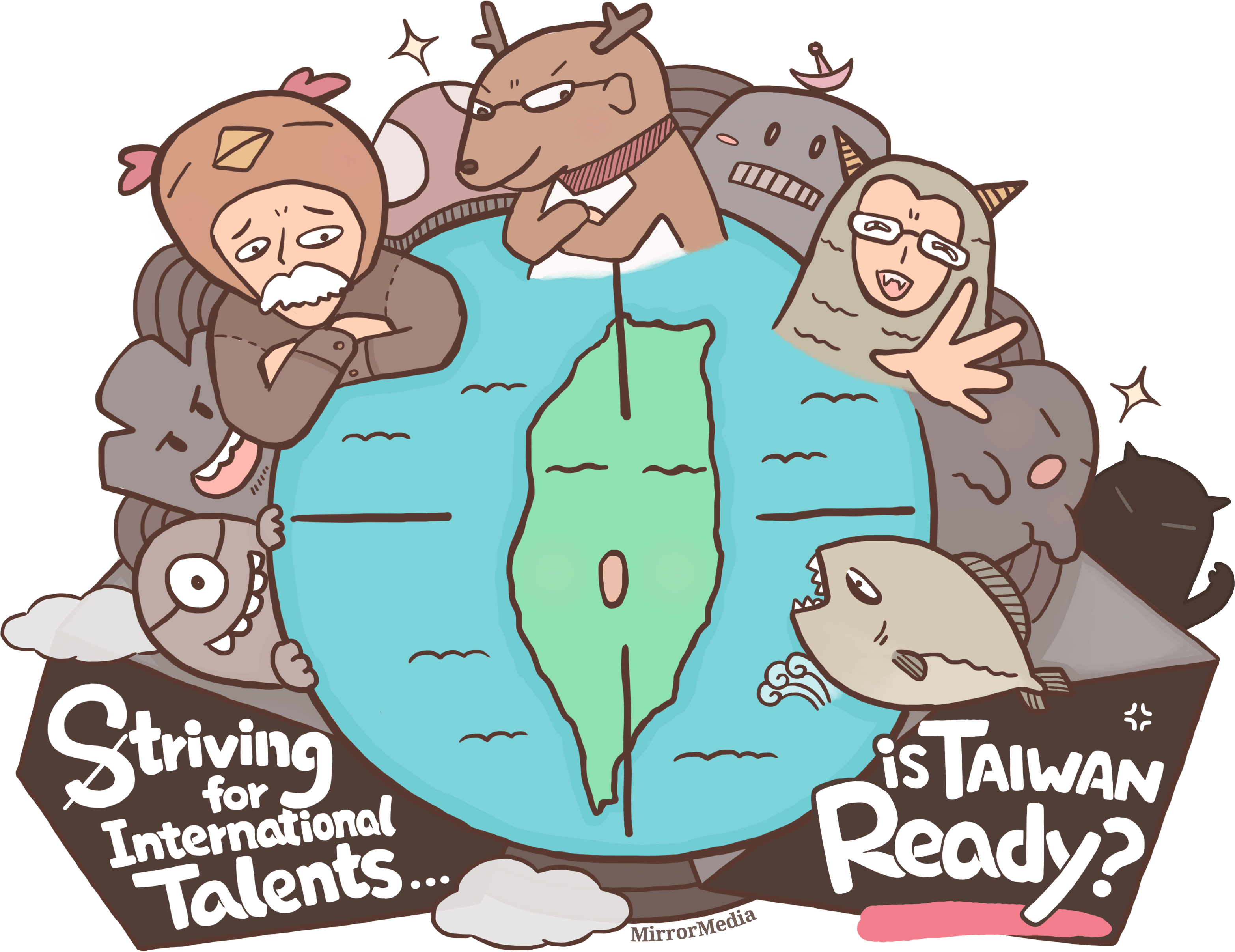
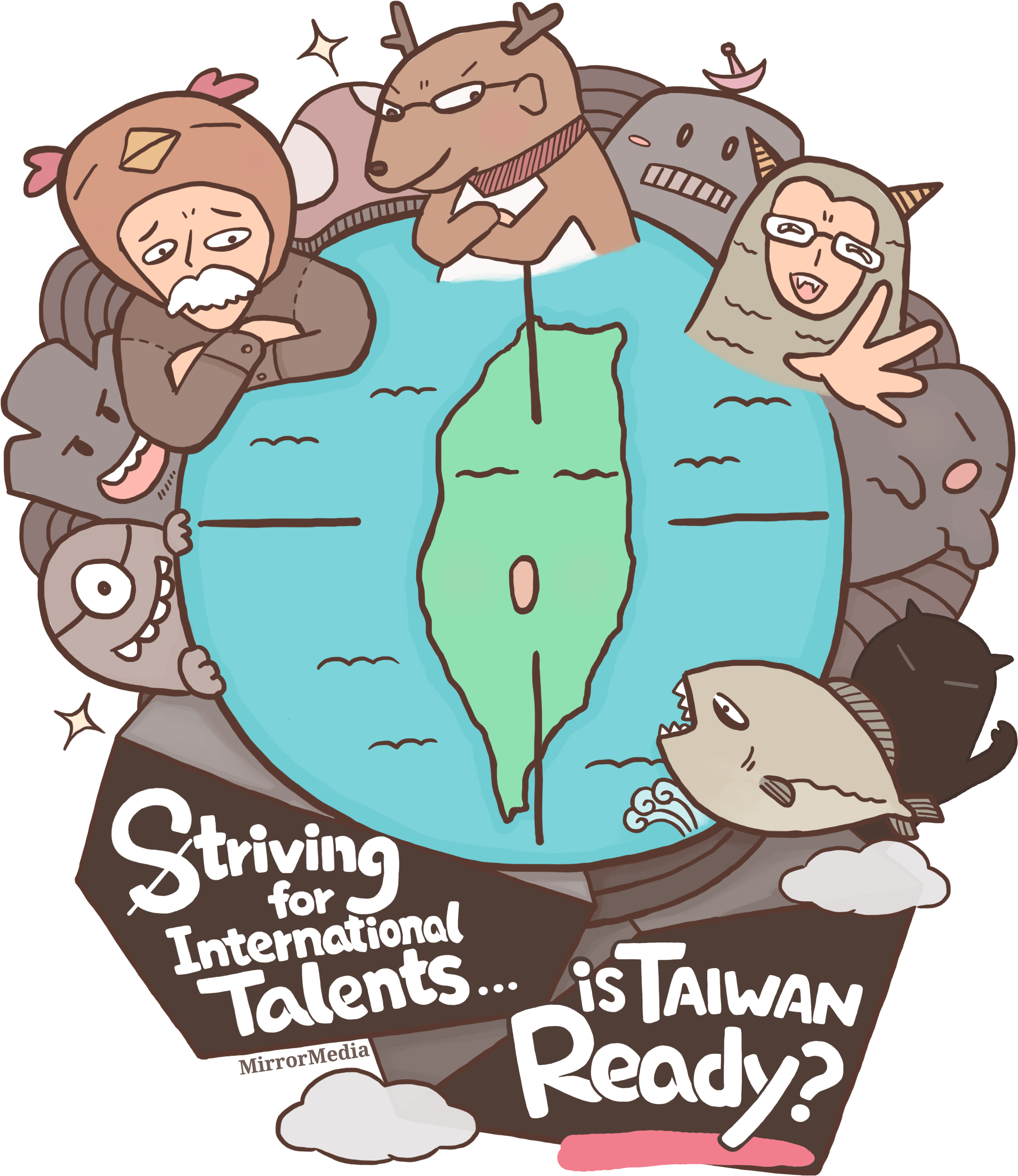


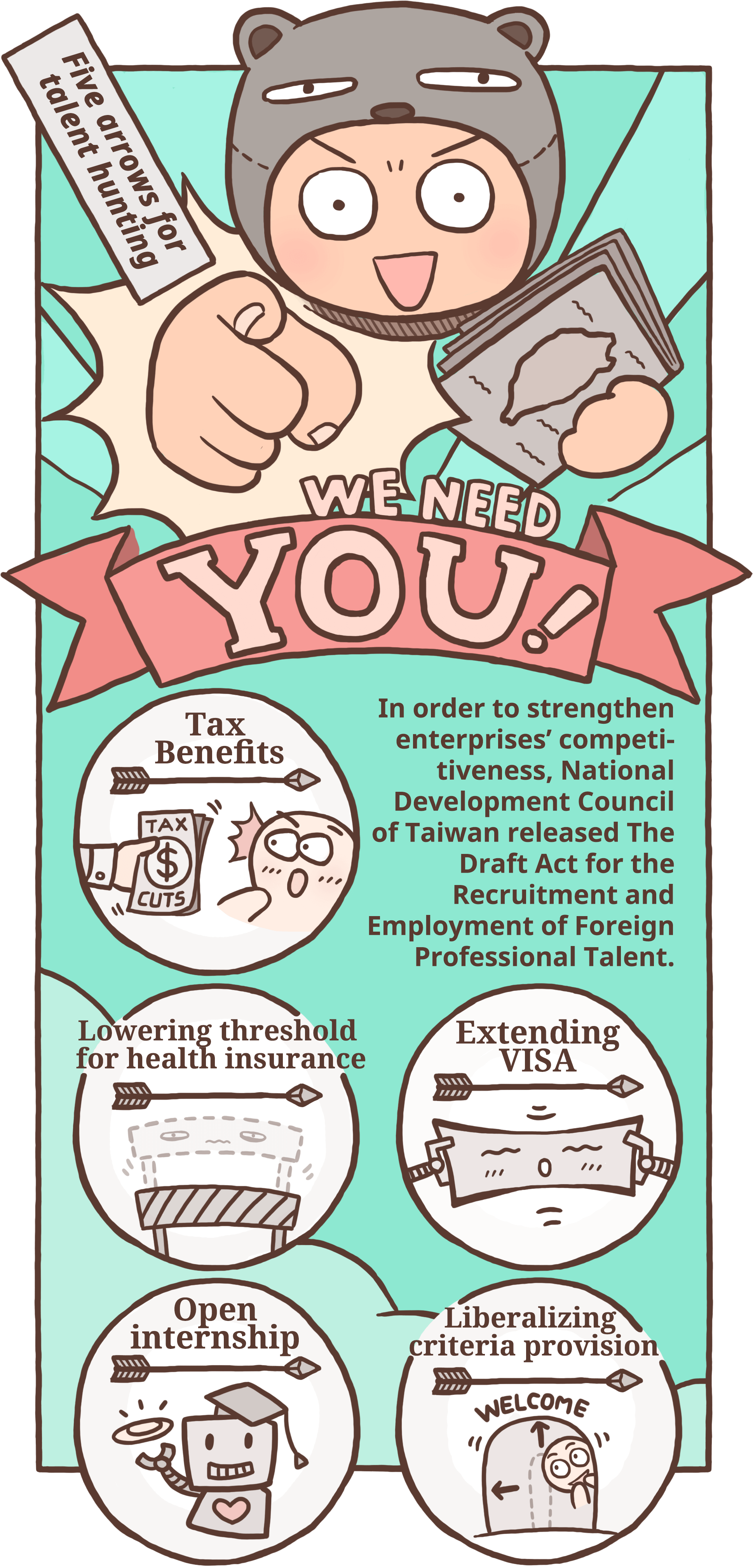
In order to strengthen enterprises' competitiveness, National Development Council of Taiwan released The Draft Act for the Recruitment and Employment of Foreign Professional Talent (later shown in the article as "The Draft")a couple of months ago. The act aims to recruit and attract foreign talents to engage in professional workfields in Taiwan by giving tax benefits, extending the duration of work and residence permit, liberalizing criteria provision, lowering threshold for health insurance and opening more internship opportunities.
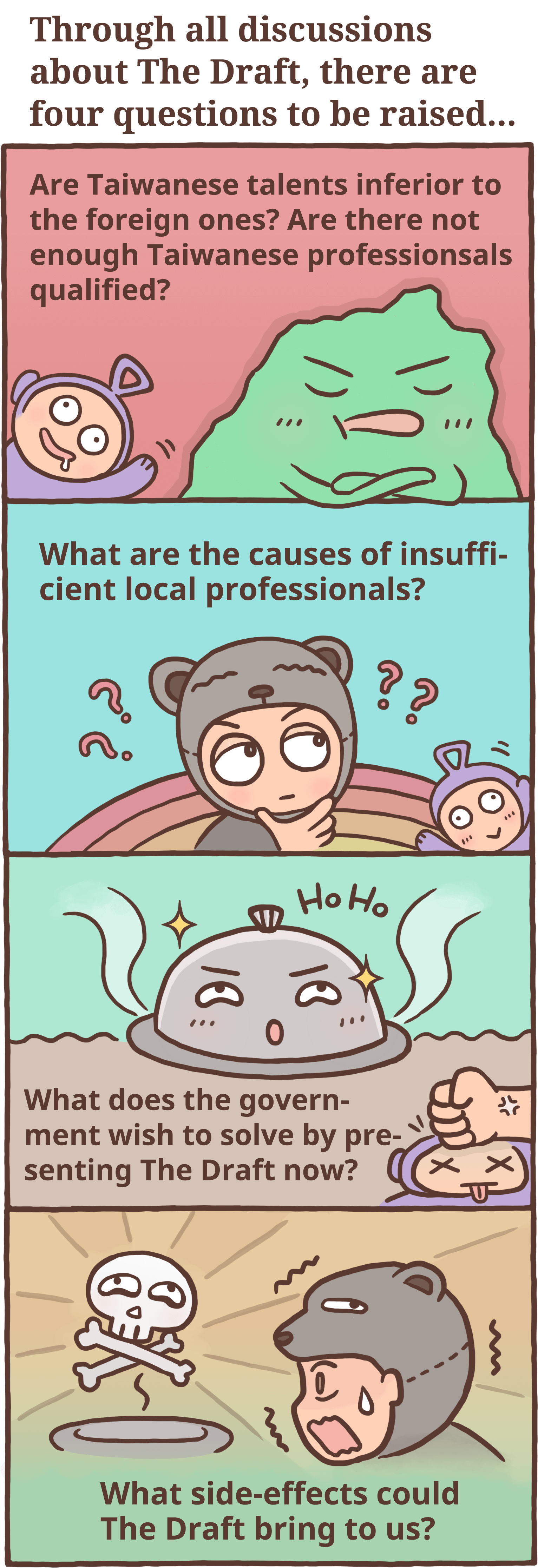
The main purpose of The Draft is to recruit and increase employments of foreign talents as said on its title. Therefore, it is essential that we look through the core of current Taiwanese talent ground , in order to better understand underlying problems, including serious brain drain, kinds of professional talent we may lack. Finally, we will be able to focus on specific articles within the Act.
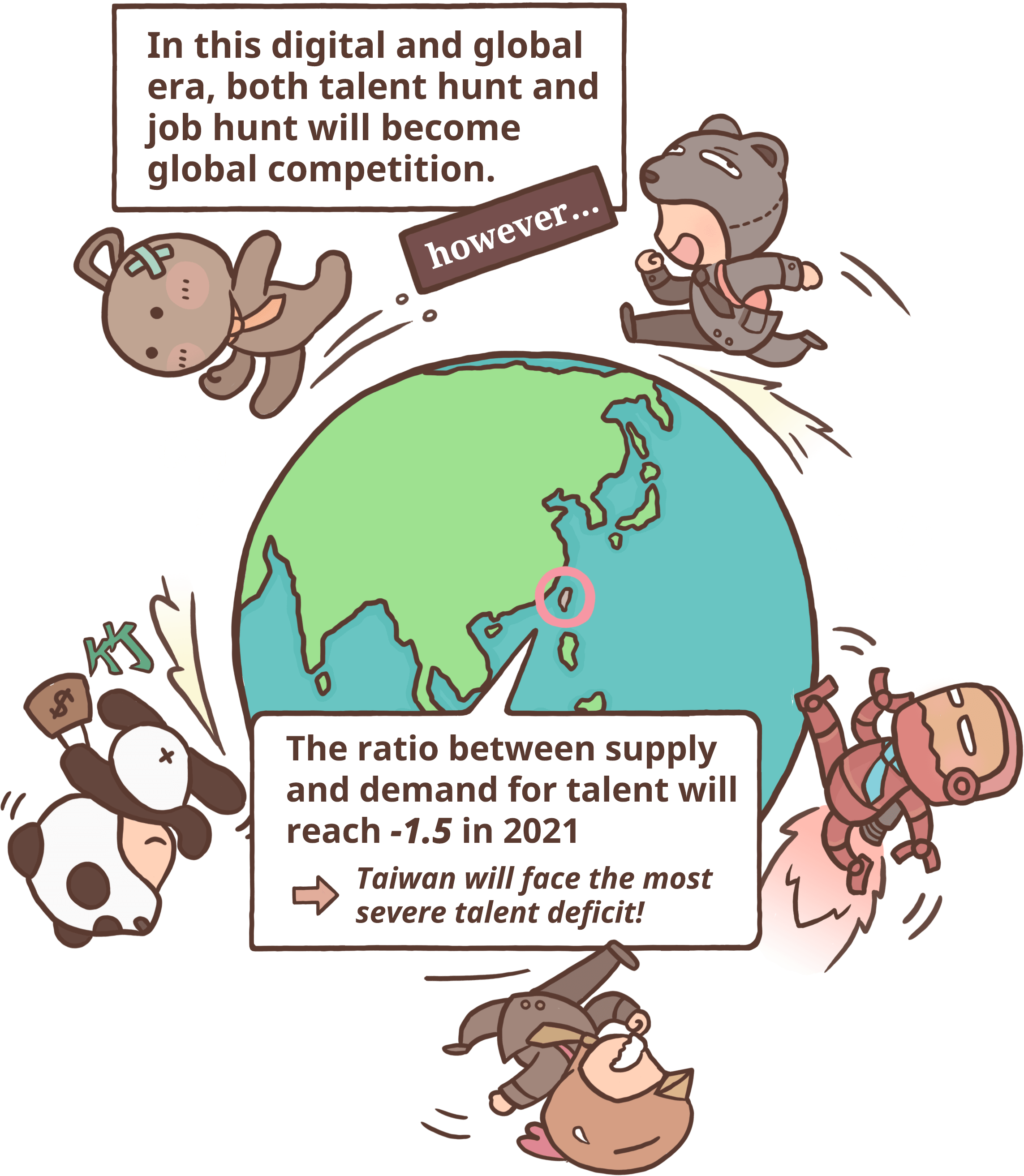
To help explore the relation between international talent flow and the competitiveness of companies and countries, Oxford Economics surveyed 352 senior human resources professionals around the world, and released the report titled Global Talent 2021. Among 61 countries evaluated, Taiwan was the country facing the most talent deficit, of which the ratio between supply and demand for talent will reach -1.5 in 2021. There will be other 25 countries facing talent shortage in 2021 as well. In this digital and global era, both talent hunt and job hunt will become global competition.
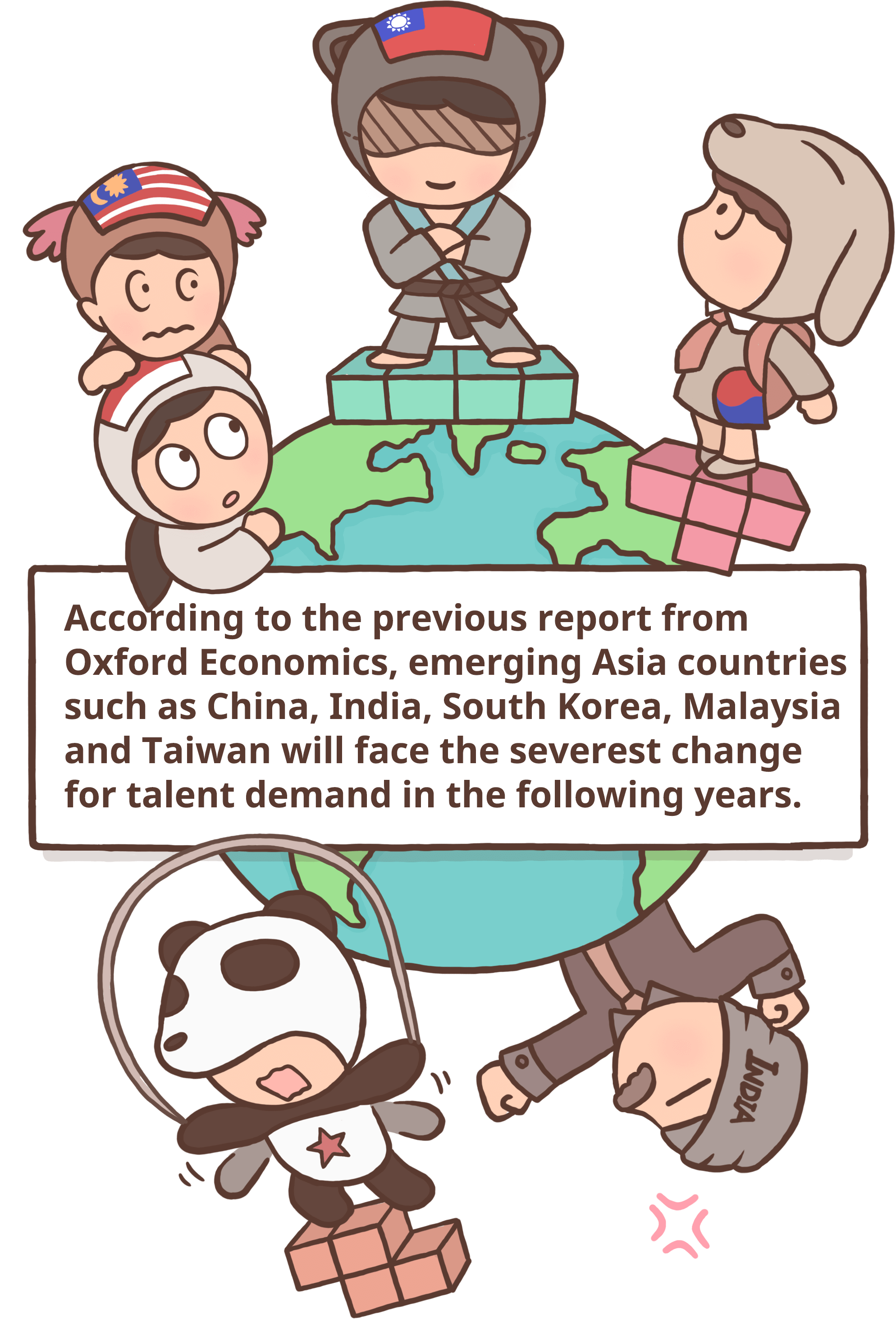
According to the prediction from Oxford Economics, in 2021, the industries to face drastic change in Emerging Asia are business service, energy, travel and transportation, but no big difference in emerging industries. Industries facing Major changes in Asia's Developed countries will be business service and travel and transportation. Emerging industries in North America and Western Europe will have largest increase in talent demand in the future.
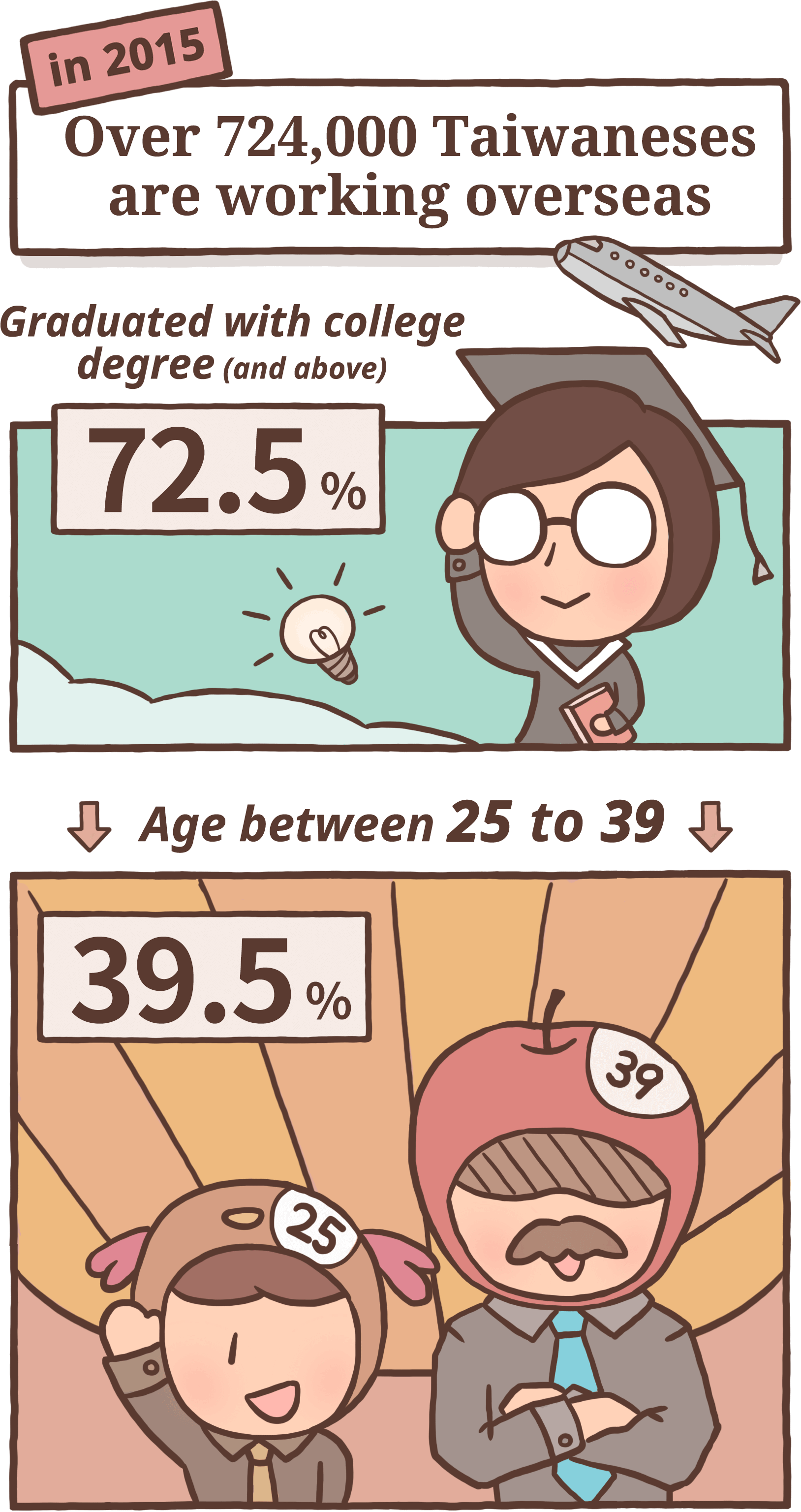
Executive Yuan announced statistics covering overseas Taiwanese manpower on March 2017, showing that there are over 724,000 Taiwaneses working abroad, and the number has increased about 62,000 more people since 2009. Among these people, 72.52% of them graduated with college(and above) degree ( around 525,000 people), and 39.5% of them were age of 25 to 39.
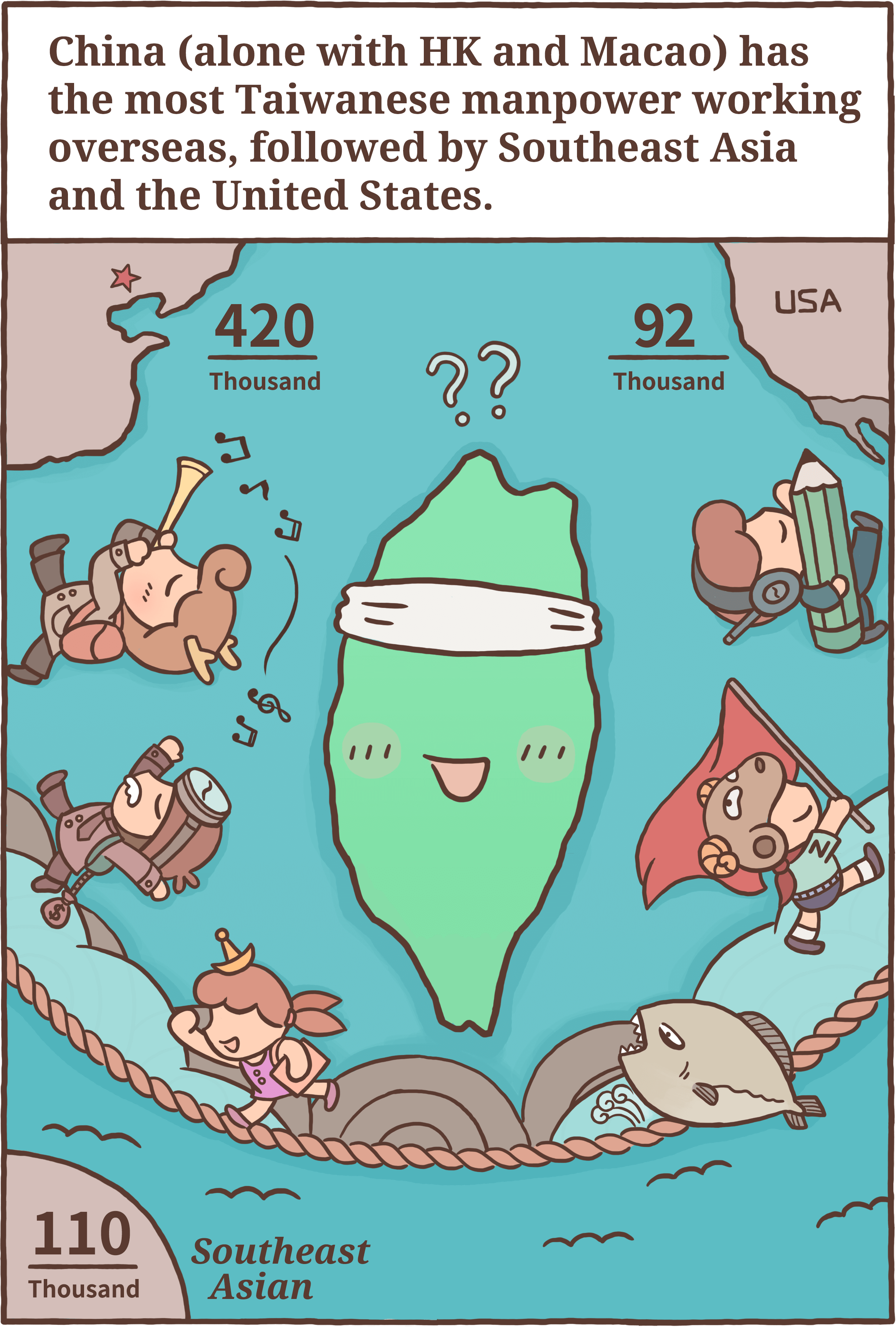
China (alone with HK and Macao) has the most Taiwanese manpower working overseas, followed by Southeast Asia and the United States. There were 420,000 Taiwaneses working in China, however, the number has been decreasing. More and more Taiwanese manpower are increasing in other areas in recent years.
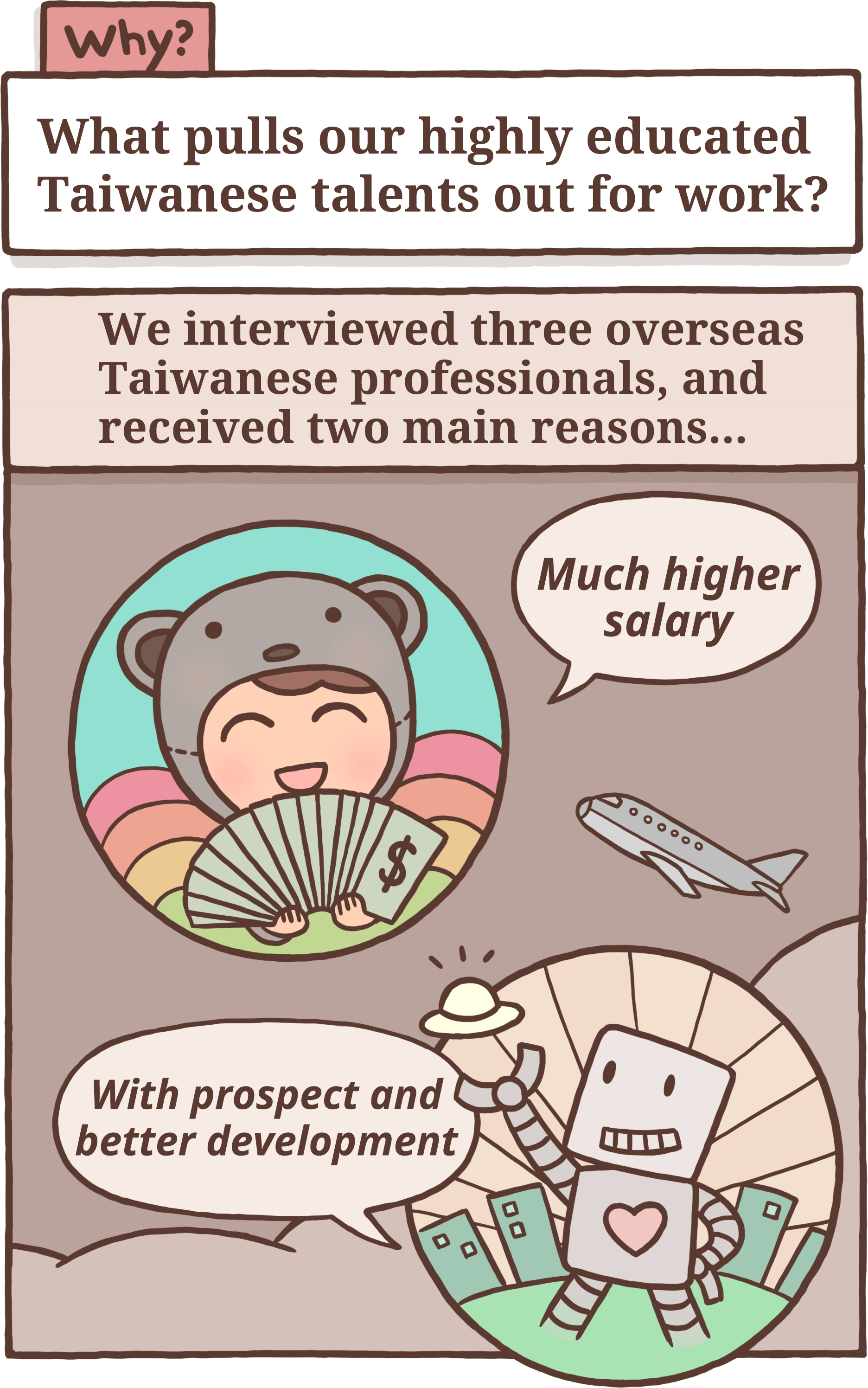
Without surprise, some of the foreign professionals currently working in Taiwan we interviewed, also indicated the low salary and lack of prospect to cause Taiwan’s low attractions to foreign professionals, which were the same reasons to pull our local talents away. In other words, if we do not solve these structural problems, it will become very difficult for Taiwan to recruit new blood, as well as to stop bleeding.

Taiwan now stands no chance in competition. You just can’t imagine the survivability of the Chinese people. They will give up anything to protect themselves by earning more money. However, I do not hope Taiwan become like this. We must ask ourselves, “What kind of country and society do we want to build?” I often thinks, if Taiwan is to be unified and lost in our generation, how will people think of us after a hundred year?
In 2008, KMT defeated DPP in both parliament and presidential election. After that, the relationship of Taiwan and China went better than before. Activities including shipping, commerce and student exchanging are getting more and more frequent than usual. A great wave of people followed Taiwanese businessmen westward aiming to earn a great fortune in this “1.3 billion Market”. During that time, Hu had already gain her career success through many years of being journalist in “Commercial times” and “Business weekly”. She is very familiar with the financial circle of Taiwan. Yet she believes that Taiwan is too small for her and cannot give her more achievement if she stays. Since Beijing is a place of many important news, she asked her friend to introduce a job for her in Beijing.
In 2009, Hu enter the “Caijing Magazine” in China under the condition of lesser salary. She then worked her journalist career in the field of foreign investment, finance and startup business. Eight years later, her salary went doubled many times. She can proudly say that she is one of the “Pusher” in techno-business startups in China of recent years.
Hu is not a Chinese citizen, therefore impossible to have a press card. Originally thinking it would bring difficulties to her journalist career in China, but at the end proved that there can always have an exception. ““Caijing Magazine” is special because they are backed by Prince Party. They had Taiwanese interns before, so I know they might consider me to get in because many important persons had already switch to different companies. I am very important to them because I understand the field of foreign investments well. So I get in without any difficulties.”
In addition, Hu explained that China still needs more talents in many fields to meet its own development goals. Yet they do not need too many persons from Europe or America. So the country welcomes many professionals from Hong Kong, Macau and Taiwan. That is why many Taiwanese can work in China now.
Hu talked about banking and securities industry as an example. She pointed out that during the Chinese financial liberalization progress, experiences and professionals from Taiwan had an important role. Such as China Merchant Bank, it was built solely by a team from Taiwan’s China Trust. Yuanta Securities was established under the same model. “When they create a new market, they prefer using many Taiwanese. Semiconductor industry must be the same. If Chinese investors have global market goals, they prefer hiring Taiwanese.”
In her understanding, the restrictions working in China is not as many as imagined. The hard part is the job itself! She often worried about how to maintain a job since the media market there is often changing in rapid speed. There was a moment when Hu felt very frustrated and sad after failures. However, when you overcome those sadness and failures, a better and more skillful person you will become. That is the greatest lesson she learned from China.
She said, “There won’t be prospect for industries if there is no possibilities for people. My characteristics suit China well. There are many people like me which Taiwanese often refer as wolves. But I don’t think myself as wolf, I take good care of my younger colleagues. I want to do something different from others, something none has ever done before. I want to try if I can accomplish that. I went to Beijing for a job when no other journalist in the financial field in Taiwan had ever done before. I think that is really cool. A predictable life is not what I want. When people have possibilities, more and more of them will try different things, thus bringing industries more possibilities. You will get bolder and bolder in the progress. After winning once you certainly will hope to win a greater triumph and to do crazier things.”
During these years, Taiwan saw the shrinking of traditional media, unknown future of new media and the stagnant of economy. Hu witnessed the same revolutionary changes from media in China. Yet she did not lose her enthusiasm in media and switch position to PR department like her many peers. “Wolf culture in China” let her saw an eager spirit for survival different than in Taiwan. Her ambition on accumulating knowledge of startup businesses and market expansion made her career went further. From journalist to chief editor, and later on chief executive. Now she is eagerly preparing to create her own startup business. She had discovered that she is actually suitable for China.
For a person who once suffered from depression due to career difficulties and went to psychiatrist for half a year, also taunted by tens of thousands of “Pink Patriots” as “Bastards supporting Taiwan independence, get out of China”, it may be weird to say herself suitable for China. But this senior financial journalist, who express her Taiwan independence speeches on Facebook and criticized mercilessly on Chinese society (and Taiwanese society also), said she actually has a different feeling toward China. This feeling came from several years of her witness of entrepreneur spirit in China.
She said “When I came in 2009, the world is not like this. There were little who believes in startup business. But now my colleagues all believe that if you are familiar with internet and know how to run business, you may just succeed even you are not dinning with big media bosses or having Baidu resources. These are something I have been through. I believe myself as one of the pushers for these conversions. The slogan of Alibaba is “Make it easy to do business anywhere”, which I think it had become a common belief of new generations in China. Nowadays, p2p financial service is leading one person directly to another, It distributes power to each person and gives everyone the equal right to do business. People can do business without POS or dealing stuffs with banks; for example, if you have a tricycle, all you need is to put a QR Code sticker on it, it can be a business as well. There are too many things happened such as these.”
“My feeling toward China is different from other Taiwanese have, because I know what kind of agony they have suffered to change their own life. I am much localized at this part. Americans needs to fight with wilderness in old times while China needs to fight the party itself now. I am worried about the world created by these younger generations might be destroyed someday. We came from a place with total freedom, there are so many things (regulations) we cannot tolerate. Our tolerance is even weaker than the Chinese. Although I know I can leave at any time, but there is no way for them to escape.”
However, it is exactly because she is “localized” and has feelings toward China, Hu has more worries and concerns on Taiwan’s situation. Compared to China, she definitely loves Taiwan more, but she also said, “Wages in Taiwan is impossible to find talented employers. I dare not come back to Taiwan if no one want to invest me, unless I make enough money. Brain drain in Taiwan is caused by low wages, the most urgent problem is money, the other important thing is possibilities of prospect.”
Hu thinks brain drain will bring Taiwan permanent harm lasting for a whole generation. Taiwan’s most urgent plan should be attracting more talented people, and there should be less regulations on startup businesses. We must revolutionize our industrial structure and welcome universal talents.
“For now, we can only attract people from India and Southeast Asia, but it must be done one step at a time and open our market little by little; the amount is discussable. As for kinds of industry to open, leave industries to decide but not by government. Hiring foreigners has risky concerns such like languages, cultures and local environments. There must be more benefits than disadvantages while companies considering to hire foreign employee, therefore it’s important to let private sectors to have the right to decide and government must not intervene. The policy making in Taiwan should not be topped down anymore.”
Hu emphasizes that we should not take those foreign national professionals as competitors or job-stealers, because “working with smart people is not called competition. It is a pleasant experience! Taking it as competition means you only see the negative aspects”. She thinks Taiwanese used to focus on domestic market in the past, but if we welcome more international talents to come they will bring new markets, therefore we should open to the world. “If you only view a foreigner as a job-stealer, then the country will become more and more sealed. Acer had its foreign CEO aiming to do business in international market, we used to have these kind of experiences, how come we become so closed now? ”
As a Taiwanese working in China, she did not understand China at first. She needed help, so she learned to work with suitable team. They helped each other out and learned new things while quickly adapted to teamwork. If the working environment in Taiwan can be as open as here, then it will get better eventually. Finally, Hu emphasized that there is still a strong hierarchy culture in Taiwan’s working place. If leaders cannot adapt changing, then they must learn to hand over their power. Welcoming foreign talents is a way to change Taiwan’s working place and industries.
“Learning to adapt new culture will bring change. Maybe it goes very slow at first, but it is a start. No need to say anything, just give it a fight!”

Taiwan is not short of intermediate and high rank talents, what we need is stronger integration. Hunting for greatest talents is one thing, but it could be only functional when we put them on the right position.
Hai (pseudonym) worked in a big Taiwanese electronics factory A company for six and a half years after his graduation form school. He witnessed the number of A company’s engineers growing from 2,000 to 7,000. His software department had gotten dozens of patents which he himself was the main inventor. Leading many programs and integrating numerous departments, Hai had been promoted fast and achieved many career successes at a rather young age. Despite having numerous titles and high payment, not to mention his good future in the company, Hai chose to leave after all.
2013 was a good year for both A company and Hai. However, he still put his resume on LinkedIn and planned to set off aboard. Before long, Apple, Amazon and Intel all interviewed with him and planned sending him to work in Europe, America or China. But he eventually went to Seoul, Korea and got a job in a smart phone department of a Multinational Corporation B company.
Everyone believes that Hai was only attracted by high salary, but he said, “there were two main reasons that push me to leave, one is the worry of the overall prospect of economic environment, the other is the anxiety of losing competitiveness.” What he had observed is, although the technological strength of Taiwan is none-inferior to any other countries, but the smart phone industries had already appeared to be highly homogenized. Fierce competition will cause lower profits, besides 5G phones is only possible to be commercialized in 2020. Conclude all concerns above, Hai believes it is time for him to leave Taiwan and learn something beyond technological engineering.
Hai explained that he doesn’t like American food and culture, plus the department inviting him is not his preferable choice. Therefore he rejected the job which everybody wants. As for rising China, Hai thought that he cannot gain real international experience due to share cultures and language. At last, he decided to went to Korea, a country which is not even in his radar.
B company is hiring international talents under a long term plan, they actually has a specialized department to deal with visas for their foreign employees and even offers education subsidy for their children. Hai said that the difficulties other companies’ foreign employees might face may not happen in B company.
“B company had many foreign employees back in the days. But it get lesser and lesser during previous economic downturn… There are two kinds of foreign employees in B company. One is someone with specialties what local employees don’t, whom they seldom laid off. The other is almost like local employees, but for B company they are there to change the stiff Korean office culture into more international type. They are changing their office culture strategically, and that is a good point of B company comparing to Taiwanese companies.
Although in reality, foreign employees are the ones that being changed by Korean office culture, after all, Koreans are famous for their strong collective consciousness and hierarchical social system. However, Hai thought that B company has advantage on their high-level strategic thinking; they are deliberately importing foreign resources to strengthen their company, and this is a lesson worth learning for Taiwanese companies.
Not just for formal employees, B company had also been recruiting students (mostly MBA) from 19 top Universities around the world by offering high salary for them to come to work as employees and interns. For B company, their contacts in universities, professional skills and familiarity toward different markets are all worth researching and making use of. Moreover, these excellent interns have a high chance staying in the company and get formal offer. Hai thinks it is really unfortunate that Taiwan hadn’t had this kind of system.
At first, Hai believed that he can be seen by international companies was because of his technological skills and numerous patents he hold. But when he entered B company, his job was more like company’s contact person for China and Taiwan partners. He felt like his talent has been wasted.
“Before I was here, I thought I will learn many things. After I came, they didn’t make good use of my talent which I think useful. I panicked a bit because I was anxious about not being able to accumulate professional skills. But then I change my mind. If I am just learning new skills, then I might as well staying in Taiwan. Learning project managing is the same, it only adds more title for me. So I change my thoughts. Taiwanese are weak in multi-language collaboration. If I learn my Korean well, then I will have more advantages back in Taiwan. A person with multi-language ability is better than a person only good at skills.”
“Honestly speaking, I learned less technological technics in B company than in Taiwan. I am more like a small gear inside a big machine here. While in Taiwan I must learn everything always afraid of hadn’t learned enough. But B company is just too big. Staying here gives me a feeling that I am staying in a nation-owned enterprise which I can work until my retirement. They do not worry much for future. It is kind of like working in ITRI where you work under stress and long hours yet you won’t quit and will continue to work for many years. There are no worries about losing jobs just because you had not learned enough. They believe their company will always find a suitable job for you. Our worries and manager’s requirement are all different. Taiwanese manager requires you to think more and learn more while B company only gives you commands. It comes with pros and cons.
Currently in B company, most foreigners are from India and China, Japanese may be the third group. According to Hai’s observation, Taiwanese engineers are no less in talent and experience than engineers from those countries or Korea. And we work hard enough so there is nothing to worry about.
But he also pointed out what Taiwan really lacked of is people with innovative and strategic thinking. If Taiwanese companies hope to strengthen themselves through recruiting international talents, then they must first find these people. We do not need more Indian engineers here in Taiwan. He then switched the conversation subject and said in worries, “Taiwan is not short of intermediate and high rank talents, what we need is stronger integration. Hunting for greatest talents is one thing, but it could be only functional when we put them on the right position.”
“Our thinking of strategy stays in hand-to-hand combat, we only know tactics but understand nothing on strategic level, and this is a problem can’t be solved only by recruiting foreign talents.” From changing office culture through strategically hiring foreigners to integrating resources within departments and sharing information, Hai thinks that Taiwan can learn a lot from B company about the scale of strategic thinking and the openness to international talents. Along with the protection of local companies in Korea and the highly integration of both the entire industries and infrastructures (from software to platform), there are too many things Taiwan can learn from Korea. It is right for Taiwan to welcome international talents, but putting those people on the right position is only step one. We have so many things need to be changed so that we may able to compete in global market.
“We tend to focus on how emerging industries can attract talents, but there is one point in Korea we can’t miss which is their strong protection policy for domestic industries. For example, Taiwan used to have companies like KIMO but what we are using are all foreign products such as LINE and Facebook. Everything we are using are all hold by foreign companies. While in Korea, they use only local stuffs. They have their own NAVER and on-line map services, many services are provided by local enterprises, and that is very important.”
Hai thinks that Taiwanese companies are used to fight alone, since we don’t have a basic platform to integrate and so many things hold by foreign companies, that will put us under disadvantage condition in modern technology warfare. Our weaknesses are many while comparing to Korea. We dare not to dream big for survival is just hard enough for us.
“Many services cannot interlink while the overall scale is not big enough. Without integration there is no value for startups nowadays. That is the most important reason why Taiwan is unable to raise innovative businesses. Korea puts many resources in emerging companies even they may be bought or merged by big corporation, at least they have this kind of business model.” He emphasized that, besides talent shortage, lacking of high-level strategic thinking and integration platform are the other two weaknesses of Taiwan. There is no way to create new value if we don’t solve these problems, and thus makes us unable to get rid of low-wage problem, meanwhile no prospect at all. The problems are still the same, and we still have little attraction toward international talents.
Hai said, Korea has good payment, living environment and infrastructures are well developed as well; that means, to attract foreigners, we must pay attention to the impression Taiwan is going to give to the world. “It is very important. Foreigners don’t know Taiwan, they only know us through impressions. We must build better images both in software and hardware. Like many Koreans, they originally believed Taiwan is just like other Southeastern Asia countries, but after they actually came, they changed their views. However, they may just refuse our invitation at first. Therefore, it is important to build our international image in advance.”

I always felt conflicted. I believe companies need to hire the best talent without asking where they come from. But on the other hand, I kept wondering whether it is just taking away job opportunities from the locals? There were many times I felt like I had robbed a job from Americans.
Chen came to love the environment when he was taking MBA classes at University of Rhode Island. However, studying aboard is not the same as working aboard. Thinking it would be both terrifying and lonely working in the U.S., he went back to Taiwan to find employment after finishing his master’s degree. Chen ended up worked for Pou Chen’s Nike division as a market developer for over a year, with a salary just above NT$40,000 ($1329.47).
Chen later taught economics and finance at Ling Tung Institute of Technology (now Ling Tung University) for three years. Although he had to take on additional work in school administration and admissions, Chen loved the stability of being a professor and being able to enjoy summer and winter vacations. So he started to consider a career as an educator. During those years, many technological institution were reorganizing into universities of technology, and the schools would subsidize faculty members to study aboard, with the opportunity to return and teach afterwards. Chen also went aboard, but he never thought he would never come back, and that the choice would cost him a fortune.
In his first year in the U.S. as a Ph.D. student, Chen spent almost all his savings accumulated over the years. He had to rely on his wife in Taiwan for financial support, which weighed heavily on him. Originally, he had planned to return to teach in Taiwan immediately after graduating. “I never thought I would teach here. My plan was to go back to Taiwan and find a job as soon as possible. Even before my last semester, as a Ph.D. candidate, I did not change my mind. But when I went back to America for my last semester, I saw my classmates had already found jobs, some of them were paid over a hundred thousand dollars a year. That was the time I started to think, ‘maybe I should stay in America.’”
Chen said that if you have the means, you can manage to secure a very high salary in American schools. Even among faculty member of the same department, there are those paid fifty thousand dollars a year, and there are those paid two hundred thousand dollars a year. It is just the norm. However, professors in Taiwan are paid mostly at the same level. This of course does not appeal to those with the talent.
Besides salary, the other thing that keeps Chen in the US is the respect extended toward faculty members. “In America, I sent my application first and took a phone interview later. After that they arranged tickets and travel expenses for me to go to another interview. I did sent my application to a national university in Taiwan at the same time, but they needed every candidate to fly over by themselves. All arrangements were accommodating the school. The difference was huge…”
“My wife did not agreed with me for staying in America. I said to her that I wanted to stay. Working experience in America would be an advantage for me when I do come back to Taiwan. Also, I was almost 40 back then, I wanted to recuperate my investment quickly. I had no money at the time, all of which I spent studying in my first school. I was under intense financial pressure.
Given the manyfold difference between wages, different levels of respect from the schools and future prospects, plus that he had begun to get used to being apart from his family, Chen decided to stay in America for a “trial.” What he did not know was that this trial would last nearly two decades. After years of teaching, he found out that America’s teaching environment is simple and the evaluation system fair and transparent. Teaching in Taiwan, on the other hand, requires networking with others, which complicate things, and pushed Chen further away from returning to Taiwan.
As a foreigner working for many years in the US, Chen said that despite existing racial and class issues in America, there is almost no discrimination on nationality. Instead, he believed that in advanced education, Americans hold no advantage. He pointed out that in American academia, there is no differences between locals and foreigners, only that whether you can work there legally. Discriminations during interviews are not tolerated. Schools even have specialized departments reviewing interview questions, so that there are no questions regarding marriage, sexual orientation and nationality, which are against the law.
“I have interviewed many people myself in America. Even if there are nineteen foreigners out of twenty candidates, no discriminations would exist. Many of my colleagues are not Americans. I guess my colleagues prefer using non-Americans, hence there is no discrimination based on nationalities. Finding jobs here are just as hard for locals. It may not even be fair for Americans. I don’t think Taiwanese can tolerate having to compete with foreigners on an equal basis while job hunting.”
Besides the absence of any discrimination based on nationalities during interview, even working visas are relatively easy to apply. Universities in the U.S. have specialized departments for international employees on Visa affairs. People with doctorate degree are all regarded as Specialized Professionals so there is no quota for their H1B visa. During their working period, their spouses families can stay in the US. They have nearly every right Americans have, except for political rights (such as voting). It is more convenient than Taiwan both administratively and in terms of safeguarding various rights. Meanwhile, Chen said, the level of ease at which one can work in America actually depends on career type. According to his observation, the professions which the US government claims to welcome international professionals are in fact the ones where they are lacking in human resource. Still, Chen also believes that there aren’t many special requirements for a lot of professions, so he understands why Americans may feel they are not protected by their own country despite an openminded society.
Teaching international business administration, Chen understands that for corporations it is natural to recruit talented persons. It would definitely be an obstruction for corporations if governments adopt protective measure for local employees at every turn. However, he also sympathizes for locals who struggle to find a job. He believes American immigration policies has already harmed African-Americans and other minorities at the bottom of society. It is also harmful for those countries exporting human resources.
Chen gave an example, “Around 70% of employees in Silicon Valley are foreigners. Americans cannot compete with these people. It is very contradictory for there is also a high proportion of foreign students studying natural and applied sciences in America. And, almost one third of all doctors in America are Indians or Pakistanis. As for nurses in California, Pilipino nurses stand for a large proportion. In India, if people can go aboard, they will go because it is cheap for them to go to university in India. But if they all go to America, isn’t it the poor in India who would suffer the most?”
“Disney had closed its IT department in recent years and contracted all the jobs to India. They even asked the original staff to finishing training Indians before they get their disbursements. Won’t you be angry if you were an American?” Chen admitted, “If my daughter grows up in America and doesn’t get a job when a Taiwanese student does, my feelings will definitely be complicated.”
Even when he is upset about this situation, as a professor of business administration, he maintained, “I agree that Taiwanese schools recruit the best teachers from aboard, because talent is all you need. But from a Taiwanese standpoint, I think there should be a compromise. You can hire foreigners when Taiwanese are not talented enough.”
We can see contradictory feelings in Chen. This kind of emotion can be seen not only in his perspective as someone who works aboard, but also on his living habits. For example, although he is a professional on international business administration, he seldom go to chain stores and department stores. He stays in the countryside when he goes back to Taiwan and avoid spending money in big cities, hoping to protect local businesses. At the same time, he believes in corporate competitiveness and the utmost importance of personal career advancement. Everything seems uncoordinated in his life.
Despite cherishing his homeland, Chen still encourages Taiwanese to work aboard and doubts that Taiwanese working environment can really attract international talents. He currently has no intention to return to Taiwan. He believes that the fundamental problem in Taiwan is still low wages. Even the law becomes easier for foreigners to come, it is still not very attractive. “Why should they come for the low wages in Taiwan?” “Some of those learning finances in the U.S. have a starting salary up of two hundred thousand dollars. I don’t see why they should come to Taiwan…I also can not understand why some professors in NTU and NCCU returned to work in Taiwan while they can teach in any university in America.”
“I have left for 20 years so there is little I still understand about Taiwan. I always tell others to stay aboard and not to return to Taiwan. The wages are too low, and living conditions are not better. Prices of everyday supplements and housing are ridiculously high. I feel pity for Taiwan when I say this. But considering personal career advancement, it is logical to stay aboard where one could be treated reasonably.” Chen said with a sigh.

If you have a green card in America then you are almost like a citizen. But in Taiwan, you cannot buy a house or apply for credit cards if you have no citizenship. There are many restrictions when buying insurance too, and some banking services are only available to citizens. When the Ministry of the Interior asked me why I want to be naturalized when I have permanent residency, that was how I answered. There are some sectors that only follow their own customs, even on matters for which there are regulations.
To keep international talents, the Ministry of the Interior promulgated the “Standards for Defining High-Level Professionals for Naturalization” in March, 2017. Except for Chinese citizen and those from Hong Kong or Macau, foreigners recognized as “high-level professionals” in technology, economics, education, culture or art, sports and other areas can applied to be naturalized as ROC citizens without abandoning their original nationality after five years living in Taiwan for at least 183 days a year and supported by a police criminal record certificate.
Fyodor is one of the first foreign professionals recognized by this standard. However, while this program seems to welcome foreign talents with open arms, it is actually hard for them to apply in practice. During his application process, Fyodor even thought once that he would become a stateless person. What’s wrong?
Fyodor came from the Republic of Kyrgyzstan in middle Asia. He said that when Kyrgyzstan was still a part of the Soviet Union they had a great education system. But the inefficiency of local governments and wide spread corruption led to an ignorance toward the value of talent, hence the exodus of talent toward Russia, Europe, America, Malaysia or Singapore for better jobs. Fyodor himself was one these “refugees” after he graduated from university.
“Originally I was going to America and Canada after graduation. Both countries had given me job offers. But when I went to American and Canadian embassies they need evaluations. Singapore’s evaluations were simpler: just fly over and pass their trial period under a travel visa. If they say yes after the trial, they will help you with getting a work visa.”
Just after 911 in 2001, Fyodor’s company closed its Asian division. His colleagues had stayed in various countries. After years of working in Southeast Asian countries, Fyodor found that Taiwan suited him, so in 2002 he decided to stay. There is a five million capital requirement for Taiwanese corporations to hire foreign employees, and Fyodor originally wanted to stay as an entrepreneur of information security services, but later found out that to set up a company, one of the partners must be Taiwanese. So he went through a lot of trouble to find a Taiwanese partner and eventually “hired” himself into Taiwan through his own company.
Over his career in Taiwan, Fyodor has worked on information security for many financial systems, and he is famous among fellow computer engineers and hacking circles for his outstanding skills in detecting vulnerabilities. And, thanks to his fluent Chinese, he is a popular figure in Taiwan. In 2007, Fyodor got his permanent residency. Because of this, and the fact that he has a stable relationship here, Fyodor began to consider settling down permanently in Taiwan. To his surprise, even getting legally married is a challenge.
“I had to have a Kyrgyzstani proof that I am single if I want to get married in Taiwan. But there is no diplomatic relationship between Kyrgyzstan and Taiwan. I had to apply for the document in Kyrgyzstan and verified it in Moscow. The whole thing was very troublesome. When we were about to get married in 2010, the Sino-Taiwanese relationship was deteriorating. China demanded Kyrgyzstan not to contact Taiwan through Moscow. Afterward, if Kyrgyzstan needed to contact Taiwan, they had to go through Beijing first. Later we heard we can get married in Hong Kong so we flew over and finally got it done.”
Having worked in Taiwan for many years, Fyodor said that there are many aspects in Taiwan that are good: sufficient public services, low everyday living costs, and an open and free society. People are friendly and they do value education. He added that for foreigners who are attracted to Chinese culture yet dislike the communist party or cannot tolerate a mess of an environment and air pollution, Taiwan is a good choice.
However, he believes that there are many things Taiwan need to improve to effectively recruit international talents to come and work here. Obtaining work visa alone is a major issue. In Germany, foreign professionals may obtain permanent residency after two years of staying, and are eligible for naturalization in just four years. It is more attractive for talented people who want to bring their whole family. As for Singapore, they too have a relatively more relaxed policy on incoming professionals. Plus, the information on visa and residency assessments is publicly available, and one can easily calculate the time it takes to obtain residency just by looking at the score, which makes it easier for career plan accordingly.
Also, according to Fyodor, Taiwanese corporate culture is still vey “Chinese”. He had a fellow countryman who came to Taiwan and was astonished when he found out he had to make tea for his boss at work, being on time and staying into the after-hours is a big deal, and getting a promotion depends on whether you’re on the boss’ good side. Such “Chinese culture” exists in banks and public agencies too. Even if you do everything by the book, there are always obstacles before you pull some strings to smooth things out. The lack of rule of law, as Fyodor perceives it, is intensely frustrating.
Moreover, Taiwanese’s English ability in general still lags behind other Asian countries such as Singapore, Hong Kong and Malaysia, which serves only to make it even more difficult for foreigners who only speaks English to settle in. There are also issues with health care. Fyodor said that a foreign couple, both of whom have acquired permanent residency are able to enjoy Taiwan’s National Health Insurance, but their children born in Taiwan must wait for six months to enjoy the same. That to Froydor is just ridiculous, and he was pleased to learn that Taiwan is going to amend related legal provisions to address this issue.
On the startup issue that received a great deal of government attention, Fyodor recalled that his former employer (Wayne Huang of Armorize) had pointed out that in America, members of startup business meeting are in their 20s or 30s. However, old people dominate the meetings of startups in Taiwan. Every decision about startups are made within more traditional sectors, whose thinking is too conventional and can’t see anything but capital investment. So, they seldom understand what is needed in the tech sector.
Since 2012, Fyodor had wanted to become a naturalized Taiwanese. One reason is that it is still very inconvenient to live in Taiwan as a foreigner, even with permanent residency. “If you have a green card in America then you are almost like a citizen. But in Taiwan, you cannot buy a house or apply for credit cards if you have no citizenship. There are many restrictions when buying insurance too, and some banking services are only available to citizens. When the Ministry of the Interior asked me why I want to be naturalized when I have permanent residency, that was how I answered. There are some sectors that only follow only their own customs, even on matters for which there are regulations,” Fyodor said.
Yet his quest for naturalization was not easy. According to the Nationality Act of Taiwan, Fyodor must first forfeit his original nationality. However, Kyrgyzstan would not consider his application of forfeiting due to its friendly relations with China. This was a constant obstacle for Fyodor until March, 2017, he finally saw hope again when the Ministry of the Interior promulgated “Standards for Identification of Senior Professionals of Naturalization”.
“The new regulations say that high level professionals can get Taiwanese nationality first without abandoning their original nationality, and it becomes the solution for me. However, the government officials were so conservative. They feared that if I passed the evaluation then I would become the first of my case being approved. There would be a lot of things they don’t know how to handle…even when there is a law stipulating such matters clearly. They were afraid that this could become a future loophole, so they rejected me at first. I had to sought help from Ministry of Science and Technology and some Legislators to smooth things out.”
In July, 2017, Fyodor received a document from the Ministry of the Interior saying that he was qualified to be naturalized as Taiwanese according to the Nationality Act. Thinking that everything was finally over, Fyodor took his document to a local service station of Immigration Agency and Household Registration Office to apply for a residency card. Yet he was told first that no such document was found regarding his approval, and, later, that he would need to become a stateless person for a year and would not be able to leave the country. It was like falling from heaven to hell.
After a long struggle, Fyodor went to other local service stations asking about his case, not wanting to give up. Finally, he found someone who understood the new regulations and had found his case number. After a series of checks and supplement documents (which he already went through once before), Fyodor finally got his identity card before the end of August.
However, after all the chaos and trouble dealing with officials, one would not think that this “new Taiwanese” would hold his new government in high regard. In Fyodor’s story, his experience in naturalization proves what he said before: in Taiwan, many things just go with existing customs, even when there are regulations.

I know many foreigners having good jobs in America and Canada. They probably live in small cities and have a good paycheck but were doing boring jobs and have a boring life. But if you come to Taipei, life becomes more colorful, a life extremely cosmopolitan, a life living in glamour. They came to Asia for this. If you live in Canada or America, you will have an impression that big cities in Asia are like this. Fast pace, countless skyscrapers, delicious food, and interesting culture. They may have dreamt for their whole lives to come to places like this.
For many Asians, Canada is a perfect place to live or emigrate to. They see Canada as a place with cleaner air, safer food, better civil services and higher salaries. But in the eyes of Aaron, who comes from Toronto, he thinks that his homeland is just a boring, tedious, and maybe a little “backward” city comparing to any Asian cities. He loves Asian culture and believes Taiwan is a more suitable place to live compared to China, Korea, Hong Kong, Japan, and other countries in Southeastern Asia. “I really love Taiwan, but it is hard to stay here.” He said.
Aaron loves Asian anime and movie culture since he was young, especially John Woo’s movies. He said that many foreigners, like him, always want to go to Asia and see what the city is like where Chou Yun Fat lived. They want to understand what does it feel to live in the city of the movie “Hard Boiled”. Just a few years after graduating from high school, Aaron went to China in 2005 and taught English in a cram school for three years. The experience intensified his desire to stay in Asia.
In 2008, Aaron went back to study Asia Pacific studies in the Department of Political Science in University of Toronto to better put the phenomena he had observed in China in a systematic context. In 2012, he received a scholarship from the University to study social enterprises in Taiwan. He became a political officer in the Canadian Trade Office in Taipei in charge of writing research reports on Taiwanese politics, economy and culture to Ottawa, before working as a special correspondent for Taipei Times. When he was applying for a working visa, officials in Taiwan, to his astonishment, refused his request saying that his experience working in China was not recognized because he did not have a college degree back then.
Despite having plenty of professional and academic experience, and an interest in Taiwan’s politics and civil society, Aaron didn’t find it easy to stay in the country. “I liked Taiwan and wanted to observe the whole election season. But I could only stay for three months. It was frustrating because you cannot find a good job in such a short time. I felt that Taiwan had rejected me.” In the end, like many foreigners, Aaron had to managed to stay through marriage to pursue a career in Taiwan.
Recalling these stories and comparing the recent news that Taiwanese government is going to implement new policies to recruit more international talents, Aaron said that the draft seems good enough and he is looking forward to it. However, he had little optimism for the overall plan. He pointed out that, “The core problem is that Taiwanese officials believe foreigners must have the same academic and work experience as Taiwanese have, where everyone would finish high school, finish college and get a job. Qualifications are to be assessed with that mentality but it is not the norm among foreigners, even among talented people.”
Aaron stressed that In Canada and America, they actually don’t value master’s degree that much. The present atmosphere is a master’s degree is a waste of money because it helps only a little in finding a good job. Sometimes a graduating from a two-year college course is more valuable in job hunting than a four-year university degree because working experience is more important. That is what makes professionals. “If they still value degrees so much, I doubt they’ll find it easy to attract talent.”
“The gaming industry is booming now, and many people have great talent coming out of high schools. I have a friend just like that. He used to work as testing engineer in China and Canada. But when he came to Taiwan for his Taiwanese girlfriend, he didn’t know how to get a job because he had no college degree.”
Aaron said that Taiwanese officials sometimes are too stubborn. They overly emphasized documentation, degrees and other formalities. Also, they apply Taiwanese standards on people coming from other cultures and countries. They are really just narrowing the definition of “talent". If Taiwan really wants to compete in the global market, it is not a good thing.
And it is not just the government, even private companies are the same. Take applying for a cellphone for example. Old regulations stated that foreigners need to present their passports together with other identification to apply. New regulations state that one can use a residency card instead of a passport. But Aaron said when he actually brought his residency card to apply, the phone company refused his application. “They do not care about laws and regulations. They just said ‘it is the rule’ over and over again, even when there are actually new regulations.” There are many problems in financial services also. Aaron said that Taiwanese companies actually care nothing about government regulations, which causes a lot of trouble for foreigners living here. The same disregard includes employers often violating the NT$47,971 minimum wage standard for foreign white-collar workers—they use many excuses to cut salaries.
On the issue of foreign white-collar workers, many believe that Taiwanese wages are just too low for foreign white-collar workers to come. However, “To speak frankly, salaries may not be much in Taiwan, but actually many people accept that,” said Aaron. He said that even many foreigners’ jobs in Taiwan are English teacher with a humble paycheck, it is the most convenient way to get a working visa formally. These people often come with the abilities and academic degrees for high-level positions. That “even a foreign loser can teach English in Taiwan” is a misconception. As described above, Aaron believes that if you can get foreigners to come to understand and love Taiwan, salaries are not that big problem to overcome.
“Some may teach English while using their spare time doing something they like. Many foreigners teach English here because it is the easiest way to get working visas. There are not very many obstacles, with no requirement of a master’s degree or other working experience. With a two-year college degree, you can become an English teacher. It is the only way if you want to stay. It doesn’t mean they are English teachers because they’re losers. I know many foreigners having good jobs in America and Canada. They probably live in small cities and have a good paycheck but were doing boring jobs and have a boring life. But if you come to Taipei, life becomes more colorful, a life extremely cosmopolitan, a life living in glamour. They came to Asia for this. If you live in Canada or America, you will have an impression that big cities in Asia are like this. Fast pace, countless skyscrapers, delicious food, and interesting culture. They may have dreamt for their whole lives to come to places like this.”
“What Taiwanese people don’t understand is that, foreigners living here actually love this place. If they have a chance to get a Taiwanese passport, they would gladly take it. If you go to Korea, China or Hong Kong and talk with foreigners living there, they’d certainly have a lot of complaints. But it always surprises me that most foreigners living here actually love Taiwan and are happy here. That’s where I think Taiwan is great. Although Taiwanese don’t know how to attract foreigners to come, when foreigners do come they grow to love this place over time and will try to stay. I am not a unique case in this regard. You can search on YouTube, many foreigners had made videos saying how great Taiwan is. However, if they need to find legal ways to stay, it is not that easy.”
Aaron said that many of these problems cannot be solved by laws or policies alone. In addition to promoting better working environment, liberating and actually enforcing laws and regulations, you must let more foreign talents understand Taiwan to recruit them. You must count on your soft power to increase their willingness to live here. If you do that, then the problems regarding working conditions will probably be more acceptable.
“Many young people want to get internship in Asia. But everyone thinks of China due to its enormous market. It is hard to attract young people to come for internships unless you are famous, which Taiwan is not. If there is a financial internship hiring, where will they pick between China and Taiwan? They don’t even know Taiwan. So you need to create more incentives.”
Aaron spoke of an example: Taiwanese pay very little attention to foreign artists whom they consider no particular “production value”. But that is actually the key to getting foreigners to know Taiwan. He has a friend living here for many years shooting photos about the ruins in Taiwan and running a famous blog. Many foreigners only heard about Taiwan through his blog and dubbed him “ the ambassador of Taiwan”. However, an artist like this still needs to leave the country every three months and gets very little attention from local officials.
“These foreign artists are more useful then (Taiwan’s) diplomatic allies since they have influence on the internet. They can help Taiwan build a better international reputation to attract people to come. You need to have these people to help your publicity when trying to attract high-level employees. People would google whether Taiwan is a suitable place to work in, and many who did write about their opinions are not foreigners in Taiwan who enjoy a high status. So you see, Taiwan really needs people who love Taiwan and understand social media. Those who love Taiwan will stay and will not go to other Asian countries because it is cozy living here. After you have lived in Taiwan, you wouldn’t feel comfortable in China and Japan. You’d find Japanese politeness really phony after a month living there.
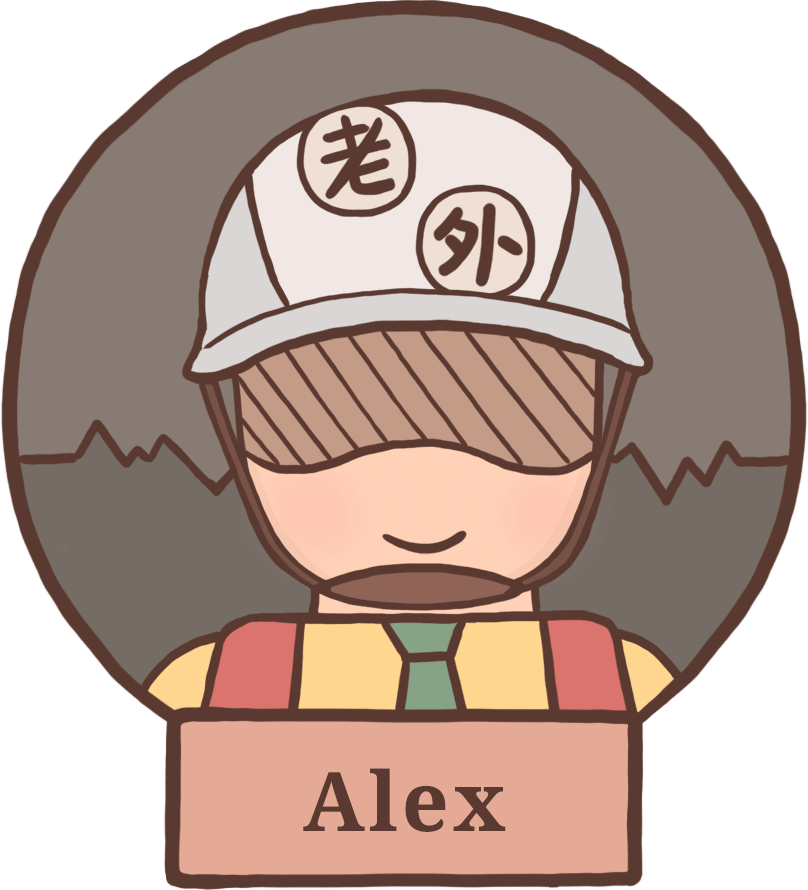
How can I prove that I’m an artist to Taiwanese officials? How should I describe my job to them?
If there is a foreigner who lives in Taiwan for four years without applying for residency, and still has difficulties speaking Mandarin, many people would simply assume that this fellow doesn’t really like Taiwan and has no intention to stay here for long. But, there are many things in the world that often challenge one’s intuition.
Alex, from Canada, majored in biology in college and had worked on many research programs. He had good career prospects in the academia, but he thought such a peaceful life was too boring for him. So he started to wander in Asian countries such as Thailand, Hong Kong and Taiwan after he got his college degree. He hoped that he might “find himself” during his journey. Alex said that even though he didn’t find out what he “want to do” over the course of his travels, but he did form a clear idea of what he “doesn’t want to do”. He made up his mind to be self employed, so that he could enjoy all kinds of freedom, including the freedom to fail.
After returning to Canada, Alex wanted to try some Internet campaigning, and, seeing Canada had no clear copyright regulations on online digital music at the time and having noticed that many professional DJs didn’t have a proper online platform to buy musical materials, he started a website for digital music material exchanges using self-taught computer skills. Surprisingly, it was a hit in the music industry, and some were even willing to sponsor the website without any repayments, hence the start of Alex’s unexpected online music career.
However, income from the independent online music database was not stable enough, and that was when Taiwan crossed Alex’s mind. He first knew Taiwan from a college course named “urbanization and global change”. One of the assignments was to discuss the possible changes in a city brought about by climate changing. Alex took Taipei as the case study. Taipei was also a stop during his journey in Asia. When he was a traveler, Alex only thought about Taipei as a good place to live with convenience, pleasant weather, low prices, a peaceful society, and friendly people. At the time, Alex didn’t thought about staying here permanently.
Later, Alex thought, if his work and income all come from internet, theoretically he can continue his online business anywhere in the world. Then why stay in a place where everything is inconvenient and cost so much? After some consideration, Alex decided to come to Taiwan. That was four years ago.
But here comes the problem. According to Taiwanese regulations, if Alex wishes to remain in Taiwan, he has to either find an employer to hire him so he could stay using a working visa, or marry a Taiwanese. However, neither are among Alex’s options. So for the past four years, Alex has continued to stay in Taiwan under a travel visa. He has to take a short trips to other Asian countries every three months to be able to remain in Taiwan.
Although his income from the internet business still cannot meet the expenses for his “travels” in Taiwan, he believes that he would have been more indebted if he had stayed in Canada. So for him it is a better choice to stay in Taiwan where everyday life is convenient, where he is able to plan for his future career and dive into Asian cultures to enhance his professional abilities at the same time.
According to article 9 from the draft “Act for Recruitment and Employment of Foreign Professionals” issued by National Development Council, foreign artists can go to Ministry of Labor to apply for working visas without an employer’s consent, with three years of effective time and can be extended if necessary. This is just the solution for people like Alex.
The questions are: would Alex be considered as an artist by our system? Hence, is he a “foreign professional” that Taiwan needs? Before answering these two questions, we must answer the question at the beginning of this article.
In fact, in addition to running his website in Taiwan, Alex is very fond of photography and traveling. When one opens the travel map he made using Google map, you can see thousands of tags on it marking many historic buildings, ruins and special sceneries in detail. What’s more, Alex carefully categorized these historic buildings with different colors, which indicate their respective status. “This one was dismantled”, “this one is OK but it is better for me not to tell the exact location so little can be done to harm it”, “this one was alternated”, says Alex.
More surprisingly, Alex can recount detailed stories about these locations during Dutch, Qing, and Japanese periods. He research every document in both Chinese and English by himself and wrote down notes after he verify the data’s reliability. The map and the stories he recorded indicate that he is not just a simple tourist, but someone who truly have a deep interest in understanding where he lives. In this aspect, he may be more “local” than most Taiwanese.
As an “digital nomad”, Alex had made a “café map” tailored for foreign travelers. It tells them where they can find spaces with internet connection to work in. He said that some foreign bloggers once dubbed him “ the ambassador of Taiwan”, and every time somebody wants to travel to Taiwan, his blog becomes a travel guide and the information shared around the world. In this way, Alex is in fact already promoting foreign relations and attracting tourists for Taiwan.
He always comes back to Taiwan after his travels every three months. He traveled alone to every town and village in Taiwan despite the fact that he speaks very little Mandarin. He researched hard and introduced Taiwanese history to others. Although, as we see it, he faced a great deal of inconvenience in his life, Alex still managed to stay in Taiwan for four years. Can we say such a man does not love Taiwan when he had worked so hard to introduce Taiwan to the world? Isn’t this the kind of “talent” that we need?
Back to the working visa for artists. Alex said it is certainly good for Taiwanese government willing to issue this visa for foreign artists and he is looking forward to the measure. However, he was pessimistic about how the future evaluation system is going to work. “How can I prove that I’m an artist to Taiwanese officials? How should I describe my job to them? This is my situation. Will it be easier for other artists to prove what they are?”
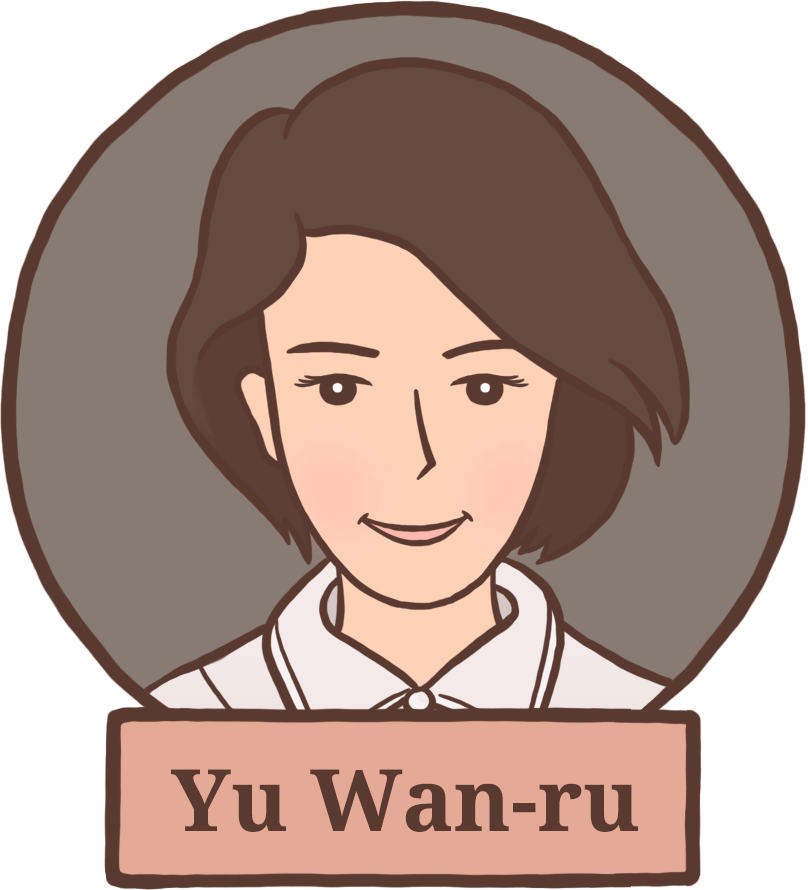
I actually don’t believe this Act can solve our problems on finding talents. I am really skeptical. Just like our attempt at entrepreneur visa in the past, where we thought there would be two thousand applicants and it turned out to be less than a hundred. We need to learn from our mistakes. What have we done wrong in that process? It cannot be solved by simply passing an Act. I believe it is a matter of national security and competitiveness. This is not my Act, I never insisted on internship or any such aspects.
Maybe some readers still remember the debates on internet when speaking of the “Act for Recruitment and Employment of Foreign Professional Talent”
The Facebook page “impolite.tw” openly criticized legislator Yu for her open objections to the foreigner employment draft under Ma’s government in March, 2016. At that time, Yu said if we replace minimum wages with the grading system the Act would become a loophole for blue-collar workers that pretend to be white-collar workers.“Impolite.tw” said that after Ma left office, Yu suddenly changed her position and started to support this policy. She also did not ask for a NT$47,971 minimum wages when hiring foreign talents.
To defend her position, Yu took part in the debate in person several times in June. She produced summary documents to defend provisions on minimum wages, job seeking visa and internship, and also debated with DPP legislator Lin Shu-fen, New Power Party assistant Chen Wei-ting, along with Wang I-Kai, former assistant of legislator Lin Tai-hua.
Yu wrote on Facebook back then, “Under this Act, internships for foreigners are recognized by the competent authority in central government. So minimum wages can be discussed. However, I'm here point out that it is pointless to set minimum wages that is very low because it would have no appeal to foreigners who would have to go to great lengths to come. But if we set it too high, then it certainly would affect the space with which small companies and startup may make their hires, which is against the spirit of this Act.
It is like a coin: on one side, recruiting foreign talents to help us raise the value of our production, and on the other local labor force may be partially replaced. You can’t just choose the good side and discard the bad side. Nor can you stop the whole Act due to the small concern of low wages. In theory, yes, there might be low wages and fake internship or part-time jobs. But in reality, the proportion is too small to be concerned about. Consider this: wouldn’t it seem strange that we blame 458 foreign interns for the low wages problem of our 10 million laborers?”
However, her arguments hadn’t been widely accepted. The debate dragged on. During our interview with Yu in late June, she said, “I actually don’t believe this Act can solve our problems on finding talented. I am really skeptical. Just like our attempt at entrepreneur visa in the past, where we thought there would be two thousand applicants and it turned out to be less than a hundred. We need to learn from our mistakes. What have we done wrong in that process? It cannot be solved by simply passing an Act. I believe it is a matter of national security and power. This is not my Act, I never insisted on internship or any such aspects.”
Although the debates on this Act focus mainly on job seeking, internship and tax benefits, Yu admitted that the issues most likely to be resolved by this Act is the residency and quality of life for foreigners already in Taiwan. These would help “preserve” existing talents. As for recruiting new talents, Yu had put it bluntly that this Act “is more about preserving talents. Recruiting is not a thing that can be solved by passing a piece of legislation”, “This Act achieves little in dealing with problems in that regard. It is aimed mainly at solving the problems that foreigners here are already facing.”
In other words, this Act is considered by legislators of the ruling party as only a method to preserve foreign talents who already live here. Hence, those who argue that foreigners are discouraged by Taiwan’s bad working environment don’t seem to be included in the scope of Yu’s arguments.
“I wouldn’t insist on the controversial parts. For example, legislator Lin Shu-fen’s concerns are that of labor. But I think for startups the Act is good enough. I think regulations for startups could be a little different and more flexible.” In the end, from the controversies of entrepreneur visa in July, 2015 and that of foreign white-collar workers recently, the focus of the National Development Council has always been the development of startups and the relatively small number of foreigners in Taiwan. That is why it is difficult for the NDC to converse with those advocating labor issues, because the subjects are in fact entirely different.
However, the Act still includes provisions on labor, education, health insurance, pension, and tax reduction. If passed, it would become rules that are generally enforceable. And the draft would not be limited to regulating startups. Once the loophole is opened, there is no turning back. Yu’s position shift, from defending the legislation to “not insisting on including controversial parts”, makes one wonder if it is simply for the sake of facilitating the Act’s passage.
Yu said that even if the controversial provisions of internship or that of job seeking visa could not be passed in the Legislative Yuan, companies will always find a solution. It is not a big deal. “But you can’t just close the door simply because there are concerns. That is not a good approach. I believe in discourse. You can of course criticize all you want, but I think we should all participate in the discussion for the benefit of progressing the issue.”
For the sake of discussion, what is Yu's position on these controversial issues? First, on Article 8, “For foreign employees with employment gold cards, half the annual amount over NT$ 2 million in their first three years in Taiwan are tax exempt.” Yu said this creates an incentive for companies to hire foreign talents. Such tax exemption benefits both companies and foreign employees, so it would be a plausible method. She believes it is an “acceptable” amount of tax cut, but remains open to discussions. She hope people can also consider the spillover effect on domestic consumption brought about by foreigners in Taiwan with high wages.
As for Internship, Yu said if people are really concerned, then maybe we should consider amending the conditions for student laborers under cooperative education programs in the Labor Standards Act, in which there are no regulations on internship wages. The Ministry of Education is drafting a piece of designated legislation, which Yu believes should be the correct approach if that is enough to address the issue. To her knowledge, there are only a small number of foreign interns each year in Taiwan. Plus, startups are usually not that inclined to use interns, so she wouldn’t insist on this issue. “The National Development Council estimated that there might be two hundred new interns coming to Taiwan a year after the Act is passed. I don’t expect that much. We’d be lucky if there’re fifty. I don’t think there’d be much trouble in this regard.” Yu said.
This Act involves a great number of different government agencies and stipulates a great number of exceptions to existing legislations. Many specific items are also referred back to respective competent authorities, which in practice is unlikely to ignore the NDC’s position. So, could this Act render provisions in existing regulations, such as Immigration Act, Employment Service Act, National Health Insurance Act, and Income Basic Tax Act useless? To this, Yu’s answer was rather vague.
“Why are we not leaving such matters in the hands of individuals agencies? Because this legislation’s provisions are strategically placed and worded. There are laws and regulations that involve National Immigration Agency, Ministry of the Interior, Ministry of Education, and Ministry of Labor that needs to be amended. So it is easier to resolve all the issues regarding foreign talents with this single Act. There’re many similar cases internationally, where countries have designated legislations for recruiting foreign talents. To amend each piece of existing legislation would just take too long, hence the emergence of this Act. Since there’re so many different issues to address, the discussion and the Act itself really doesn’t focus on any specific one.”
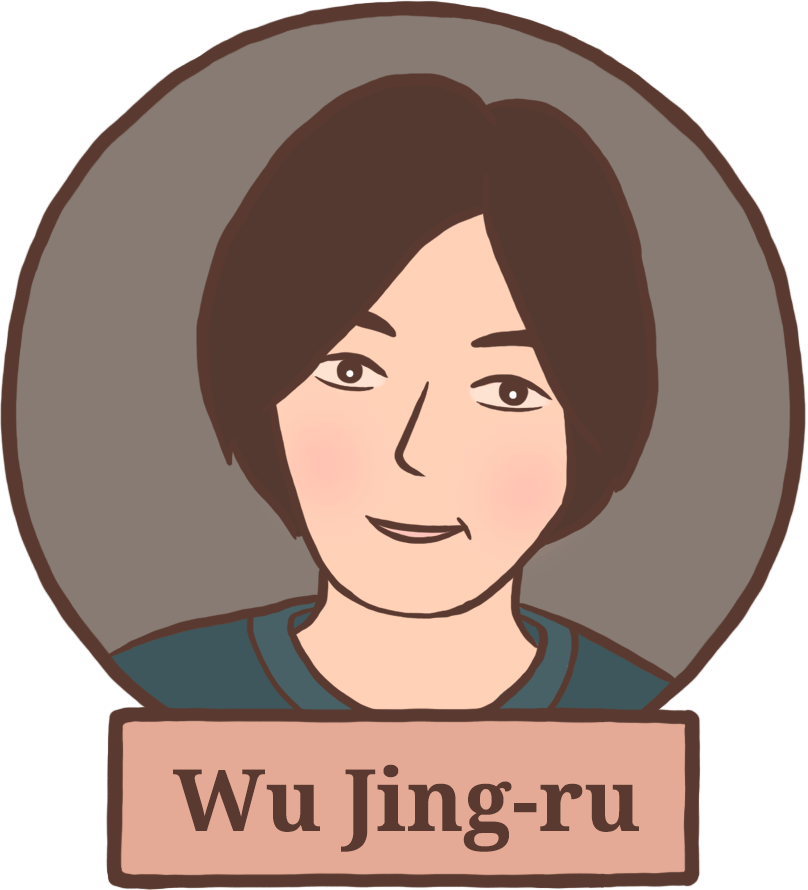
All these other provisions seem trivial. You can tell what they really want is the internship in article 19. The other problem is the tax-benefits part. In other international cases, internship always causes big problems with its many loopholes, so we shouldn’t agree to this provision. What is really disgusting about this draft is this: it deals with people, but only considers white-collar workers as people. Why is that?
Taiwan International Workers Association (TIWA) has for many years worked on immigrant workers’ rights. To most people, TIWA’s attention goes to those working in construction sites or to caregivers of elders and the disabled—the so-called “foreign laborers” and “foreign nurses”. However, to Wu, they are all laborers and everyone is equal regardless of jobs, social status and the color of one collars. They are all “foreign laborers”. So naturally, TIWA had their attentions on this specific legislation about “high-ranked white-collar workers”.
Wu said that the draft issued by the National Development Council has problems regarding to the internship system, tax-benefits, and job seeking visa. Over the course of the interview, several items were mentioned that were “most ridiculous”, “most exasperating”, “most preposterous”, “most controversial”, “most objectionable”, and “ most disgusting”. These items are presented below in an attempt accurately reflect Wu’s opinions.
The most ridiculous thing I believe about this legislation is that the competent authority is assigned to the National Development Council. Some matters may need to be discussed with Ministry of Education or Ministry of Labor, but all final decisions come from the National Development Council because no one dares say no to them. Now it is all about “the economy”, and even the Ministry of Labor does not report to the Council, it is acting like the latter’s staff.
The most unacceptable thing is that when many foreign spouses are looking for jobs under the impression of being a marriage fraud, these white-collars can have a whole year to find jobs. It is totally okay to give them time, but currently blue-collar workers have only two months to find new jobs when they have issues with former employers. At least give them the same amount of time! Maybe it will cost a big impact with new recruits, but at least you can apply the same standard to those blue-collars that are already here, can’t you? They have made their contribution to Taiwan, why can’t they have a year to look for jobs while white-collar workers can?
I see no sense in tax benefits. It is preposterous to earn more but paying less taxes. I mean, even smoking is taxed. It is all just helping employers to save more money for themselves.
You need more research when you are trying to regulate minimum wages when hiring foreign white-collar workers. Every profession have its own average wages, and in some professions, such as engineers, they might be above NT$47,971. The legislation states that it is legal to hire professionals if salaries are higher than NT$47,971. But does it meet the average wage in all professions?? If not, then you are just lowering their salaries.
Several years ago there was a discussion to bring our workers back from aboard. So they raised the Employment Stability Fund to try balancing quantity with prices, so you can hire more people and receive more funds from it. We knew some employers would rather pay more to the Employment Stability Fund to hire more foreign blue-collar workers, where the company could save more than just salaries—foreign blue-collar workers are easier to handle and companies do not need to pay for their pensions.
Still, All these other provisions seem trivial. You can tell what they really want is the internship in article 20. The other problem is the tax-free part. In other international cases, internship always causes big problems with its many loopholes, so we shouldn’t agree to this provision.
Article 19 looks nothing like an internship regulation. I once asked THE Union and they shared the same thought. Basically this article aims at foreign graduates or people less than two years from their graduation. But you are not a student after graduation. They are clearly all laborers. This article should be erased.
The mentoring system is what can be considered as internship. You do and I learn. They are still learning from their internship. After they have done their learnings they can become formal laborers. This is what internship is all about. But when you put interns into working places and let them start working for you, then they are creating commercial value which requires payments. Even they are still learning, they learn it from work. That is what the employers need to provide to their employees. It is called a job when you let employers benefit from the result of their work.
Last Legislative Yuan session also discussed the grading system. Anyone who worked should be considered a laborer, even overseas Chinese students. Internship, or whatever they are trying to implemented, is all an excuse to lower labor benefits, just like what’s done to student laborers under cooperative education programs. Universities nowadays are all job-oriented. They clearly serve capitalists. The internship after two years of graduation is just an excuse to benefit capitalists. We absolutely object to that.
After I read this draft, my greatest impression was that I had heard nothing but bullshit from the government. On the matter of employment gold card, they said if we want specific foreign talents to come, we need to resolve certain issues when they are applying for employment permissions, job switching permissions, and multiple jobs permissions, and the like. So we imported the PEP system from Singapore. You can switch employers, do multiple jobs. It is needed when you wish to maintain regular laborers. For recruiting international laborers, it is good. For us, laborers have full protection regarding their movement.
Family reunion right is good. It is also good that the government plans to adjust the timing of National Health Insurance eligibility for them, where under current regulations they have to live in Taiwan for six months to be able to enjoy the NHI. However, it doesn’t make sense for the government to treat these people as human beings while excluding blue-collar workers. When indeed has the government ever treated blue-collar workers as people? These conditions have never been applied to blue-collar workers before.
For blue-collar workers, these human conditions seem to have never even existed. In the past, the competent authority is the Ministry of Labor. But now it is led by the National Development Council under the name of economic development. It is rather hard to impede this legislation from passage. We do hope blue-collar workers can share the same standards. But we must erased the parts on internship and tax-free.
“What is really disgusting about this draft is this: it deals with people, but only considers white-collar workers as people. Why is that?”

The debates and arguments never ceased from the very beginning of The Draft, since it concerns the competitiveness of Taiwan, demands form emerging industries, residence permit for foreign professionals, and the protections on domestic laborers. It will be difficult to reach common consensuses upon this issue.
Opinions pro The Draft to be passed claim that, it is an urgent issue for Taiwan to upgrade to higher competitiveness. Meanwhile, the number of foreign professionals and foreign still studnet interns is not a big group in Taiwan anyway. It will have little impact toward the domestic labor environment.
On the contrary, voices against The Draft blame the foreign internship system for dragging domestic wage down, which might even become a loophole for labor abolishment. They also claim that the real problems in Taiwan are low salary and limited prospects for labors, as well as the slow pace of industrial upgrading. Therefore, the real solution is to solve structural problems first.
If as what Yu Wan-Ru said, the main function of The Draft is to solve problems which foreign national professionals might come up with, the debates from two parties do not really converse. In fact, even for those who still hold concerns about The Draft, they did not oppose simplifying application process or letting foreign workers acquire Employment Gold Card. The real battleground lies in government giving out tax benefits, One-Year Employment-Seeker Visa, and Internship system to foreign workers. If Yu’s claim is true, the governemnt could include more discussion on not controversial articles, The Draft could sound feasible for both parties, eventually put the law into practice.
However, the key issue within The Draft is that it does not seem to guarantee to fundamentally solve Taiwan’s brain drain and enhance motives to attract foreign white collars, which are the real possible solutions to improve Taiwan's global competitiveness. This is also what all private sectors expect the government to offer. How long would we still have to wait to see the practical solution that could really bring about change?
Most important of all - even though The Draft may not solve all the troubles we are encountering, it must not become another troublemaker itself.
Written: Jhong, Sheng-Syong
Translated: Chang, Su-Hau and Jhong, Sheng-Syong
Web page: v_k and KC-TWNo1
Release date: 2017.09.18
